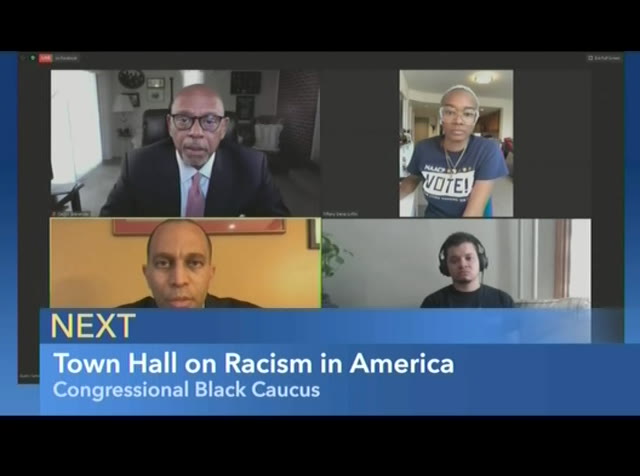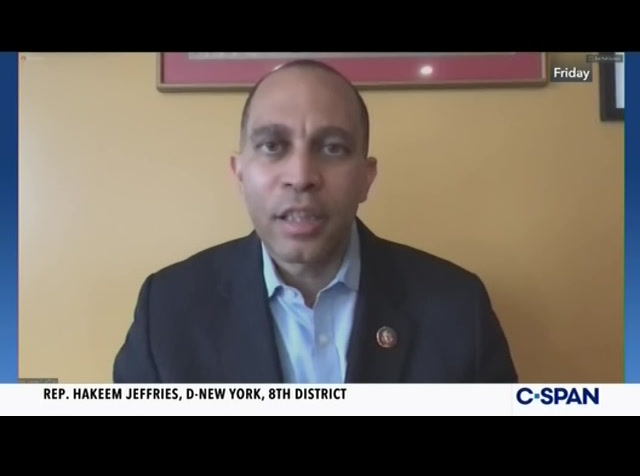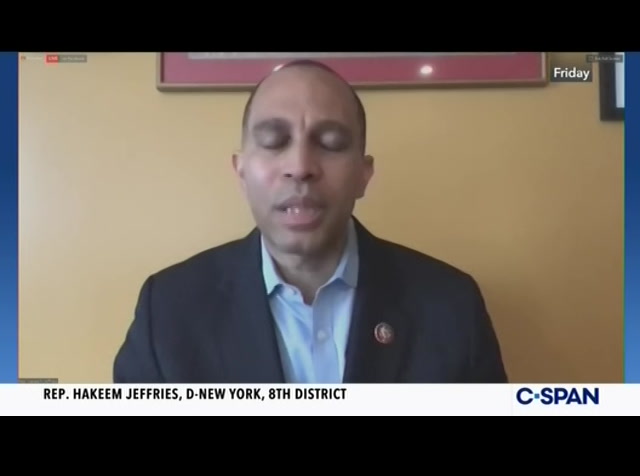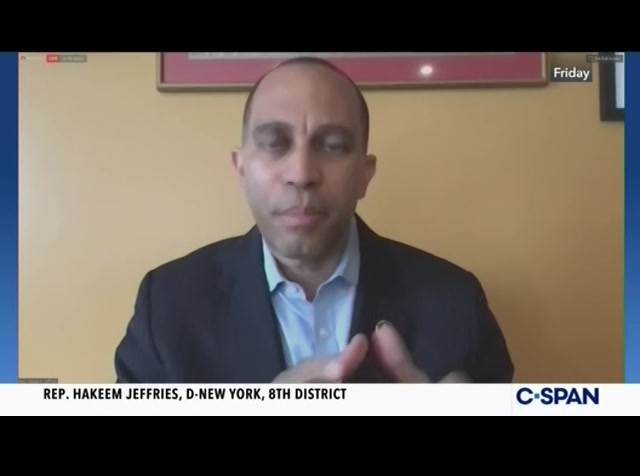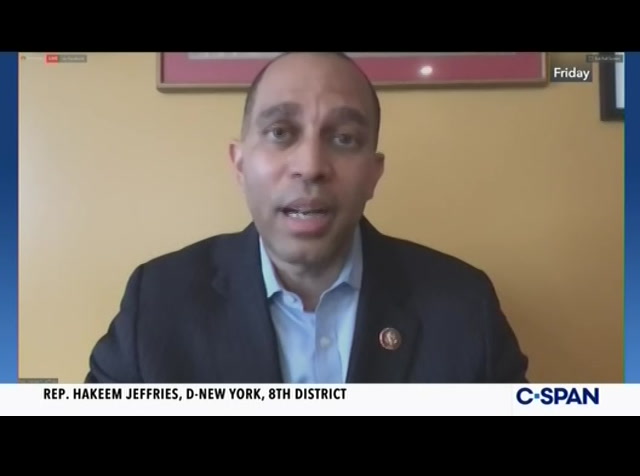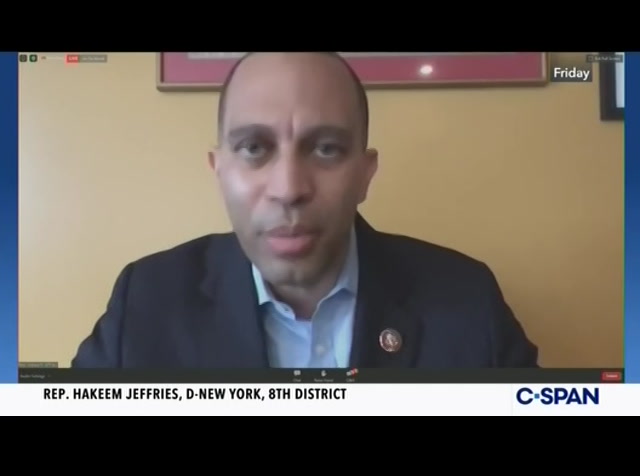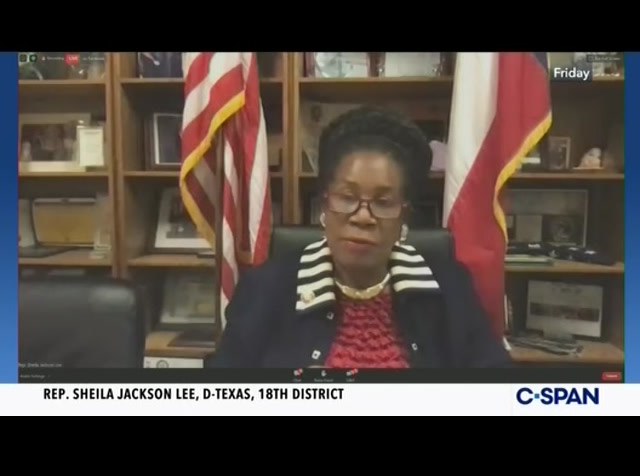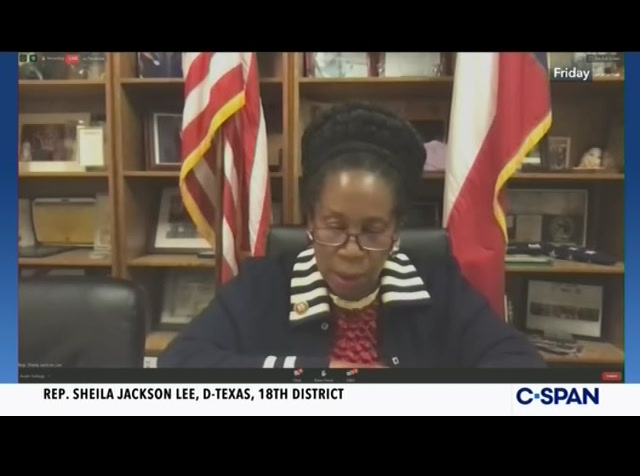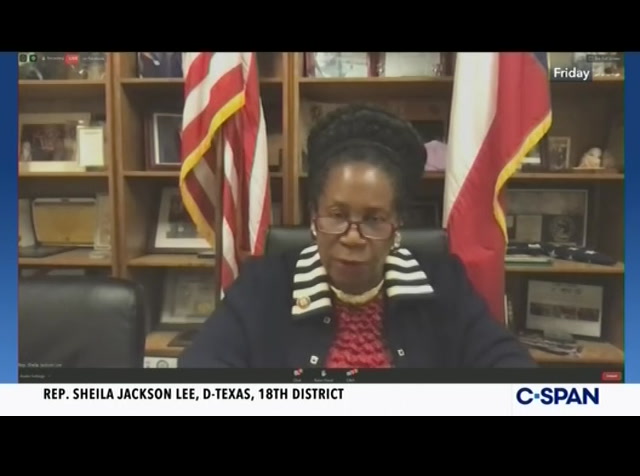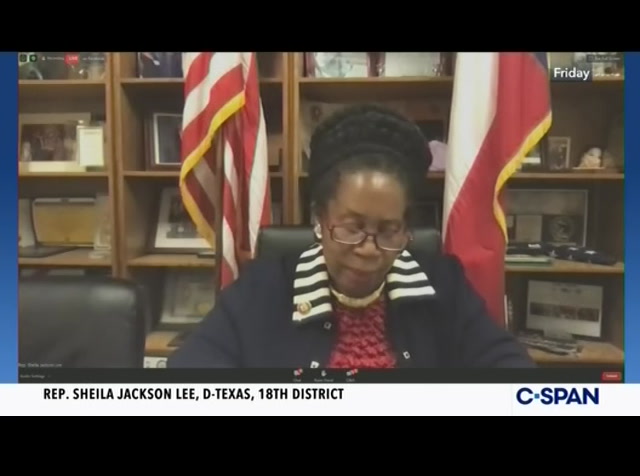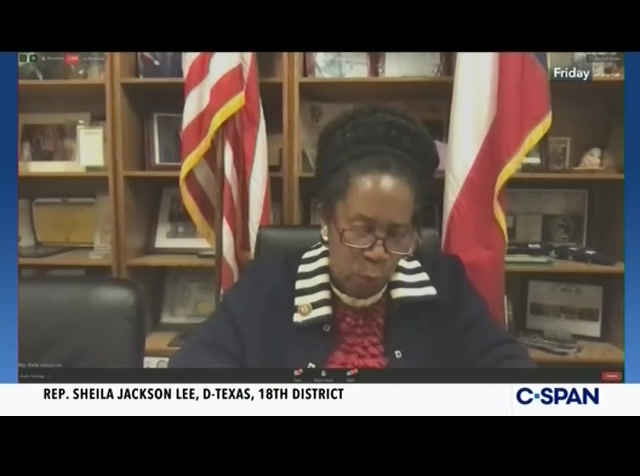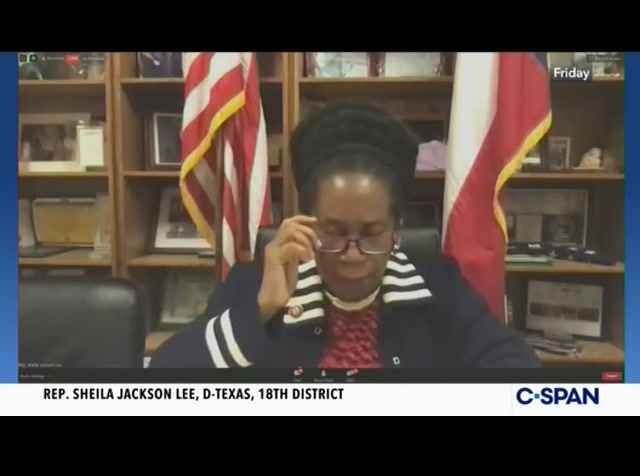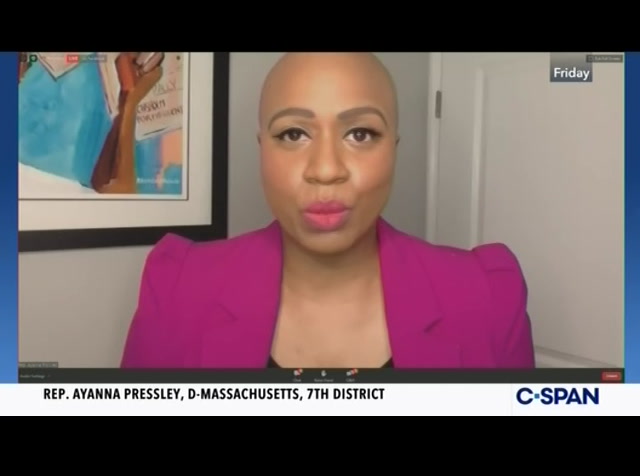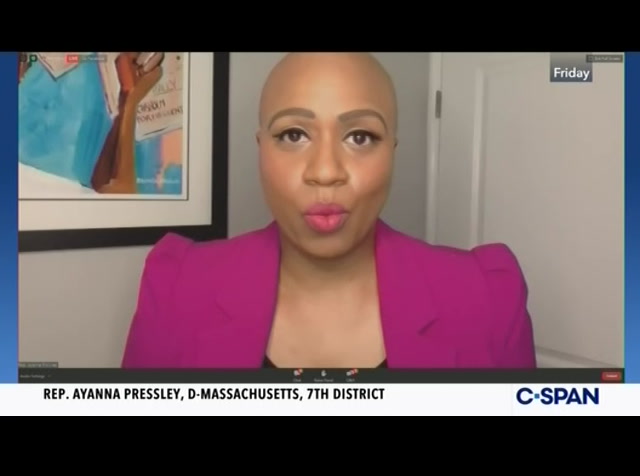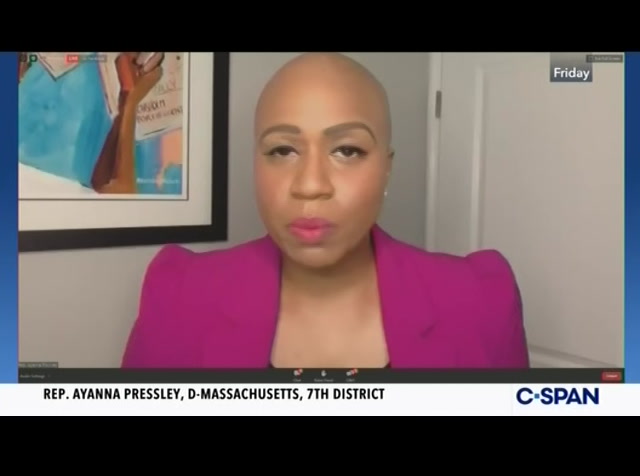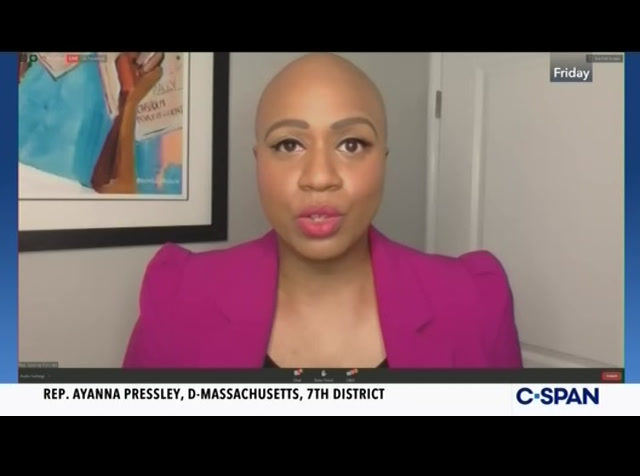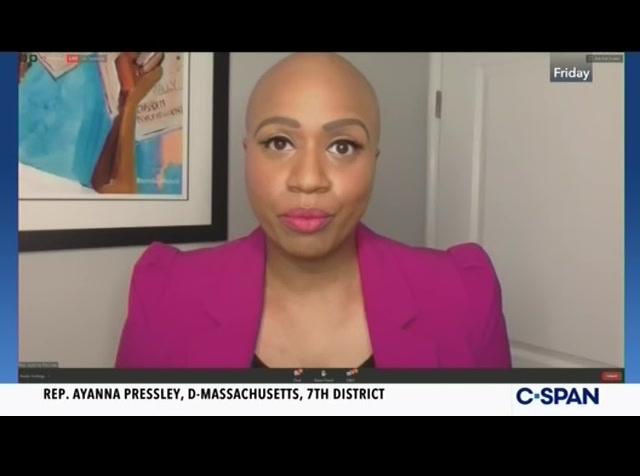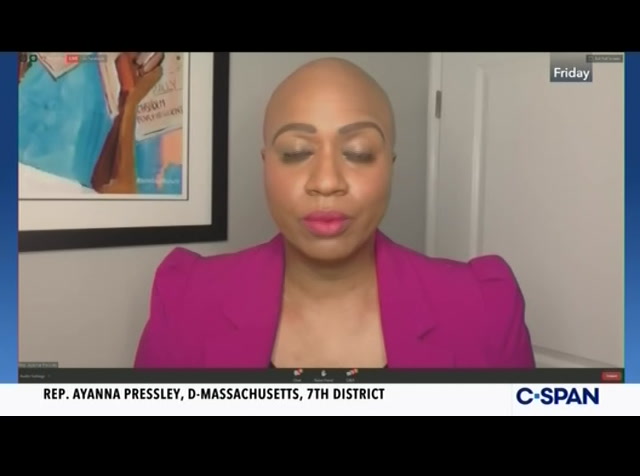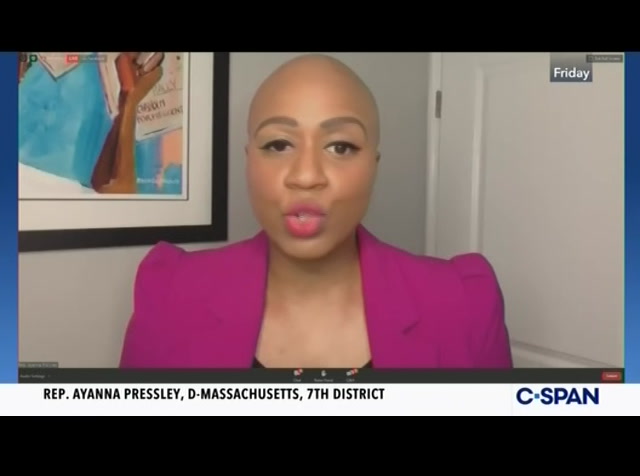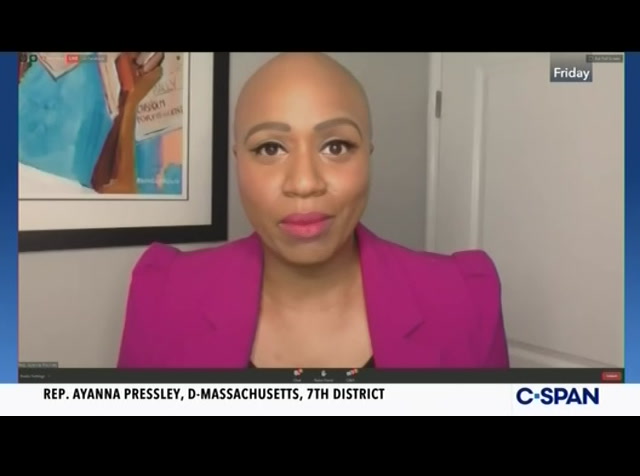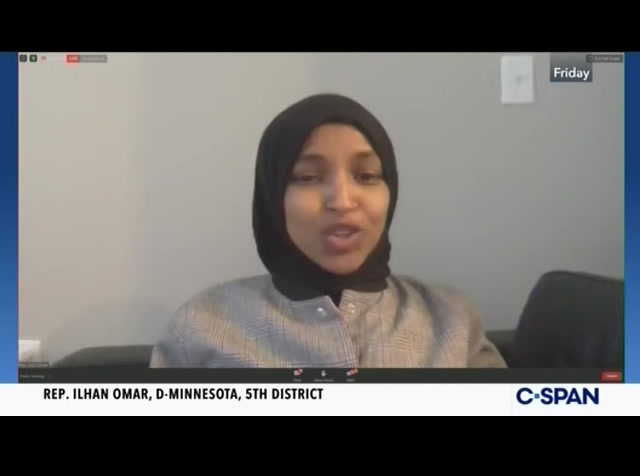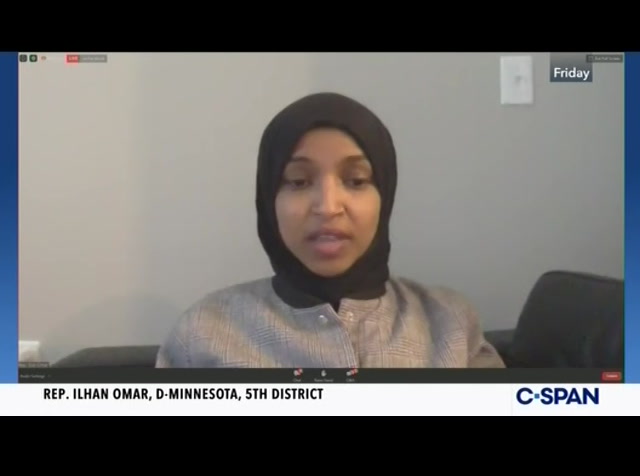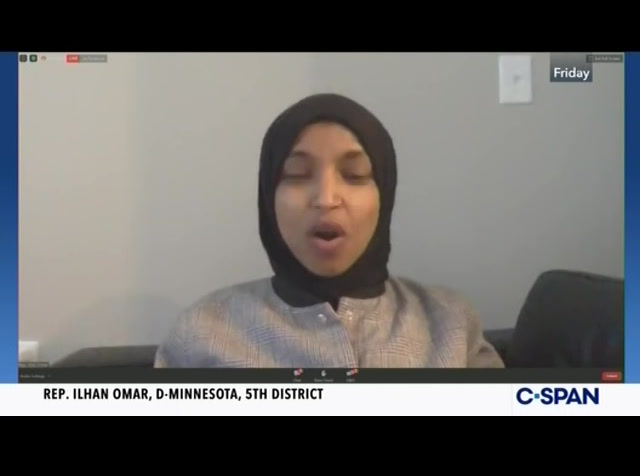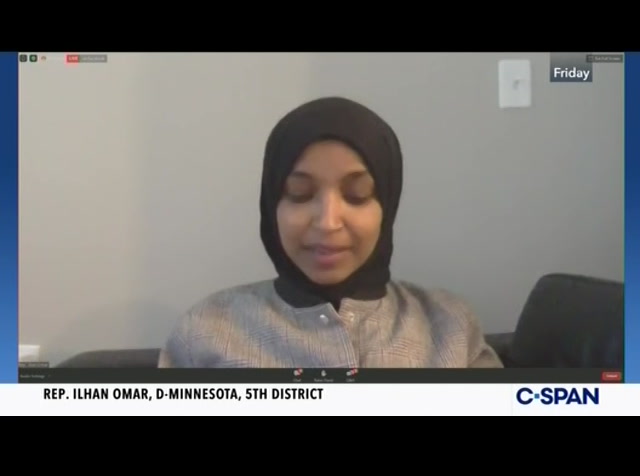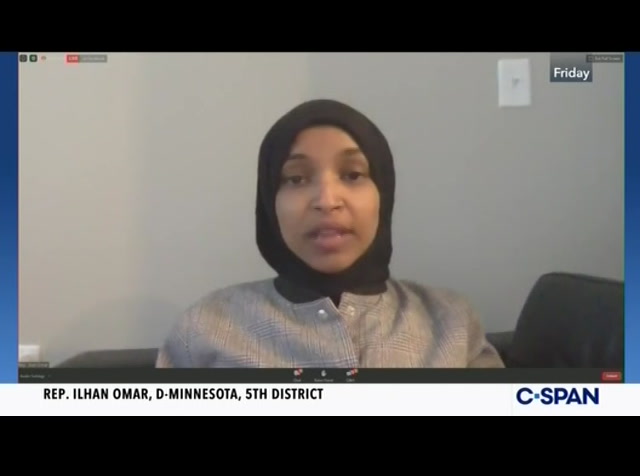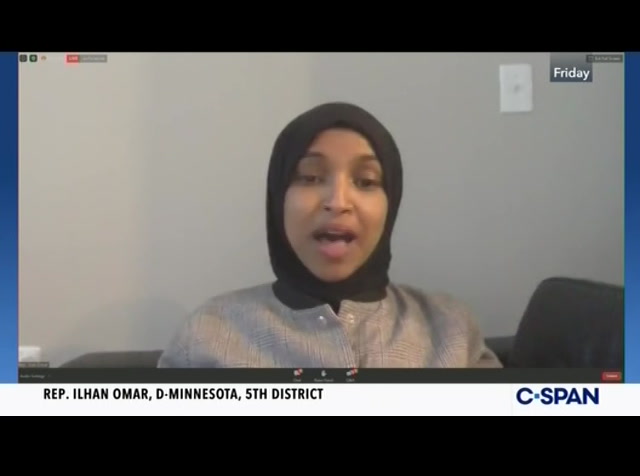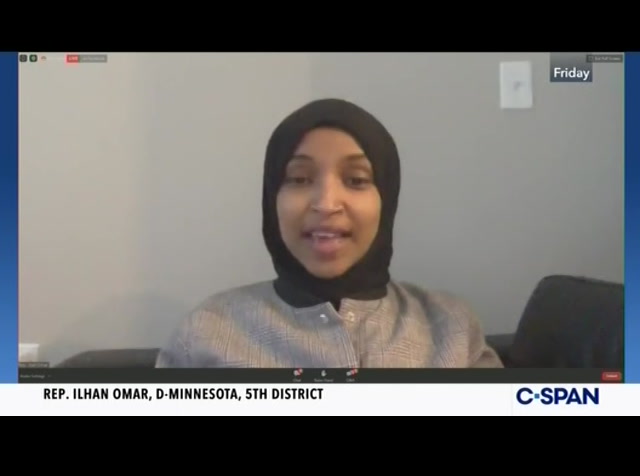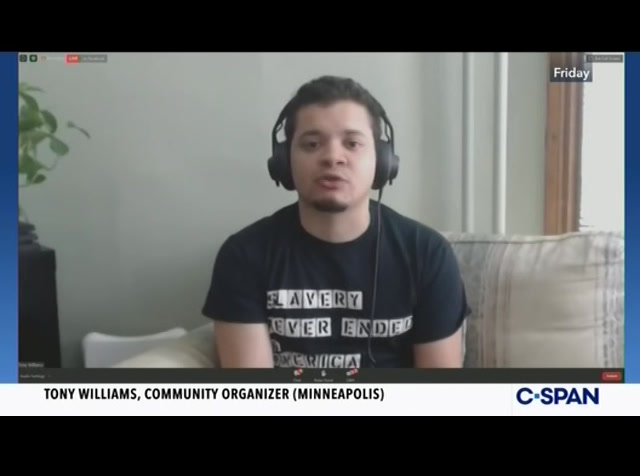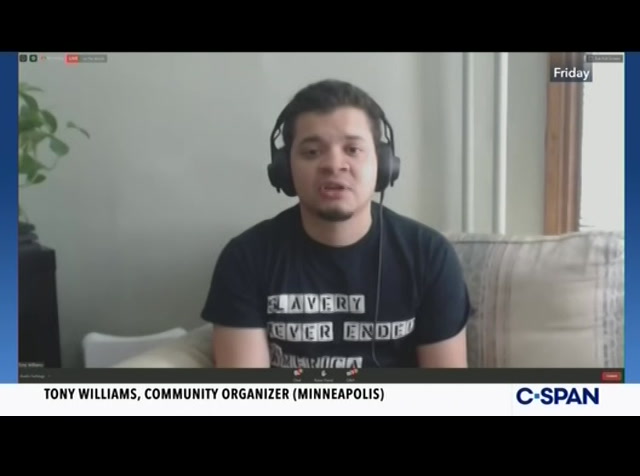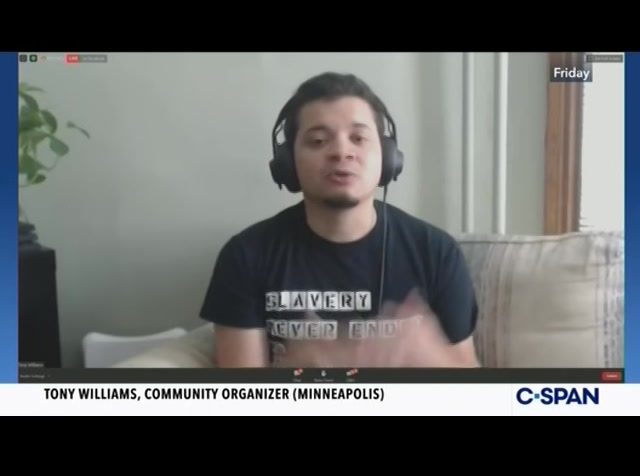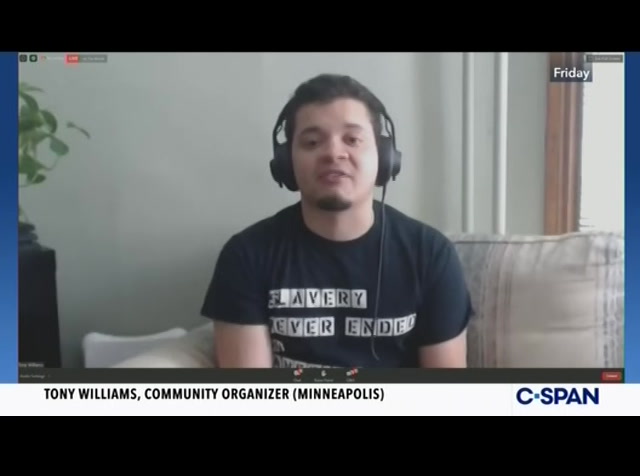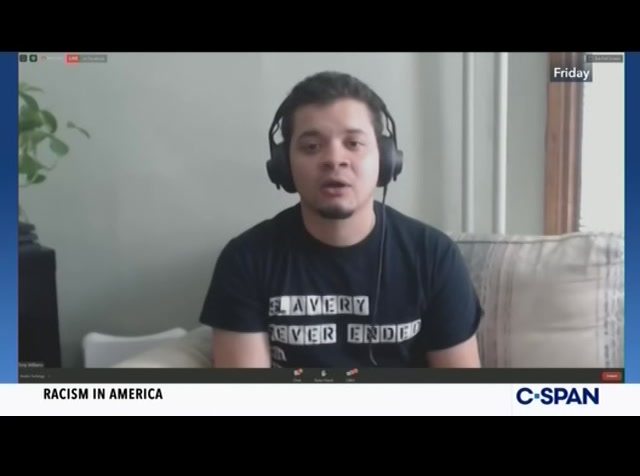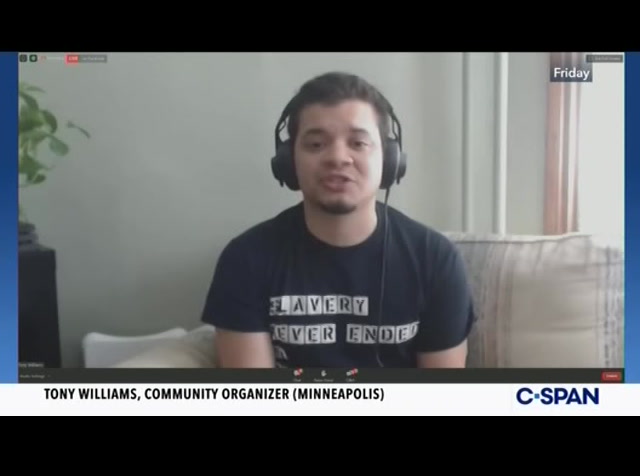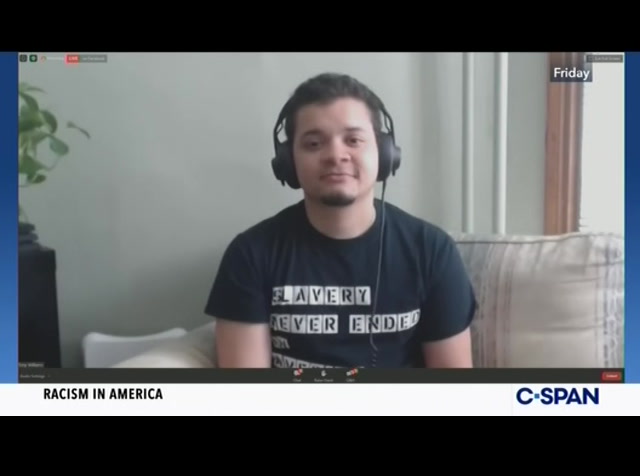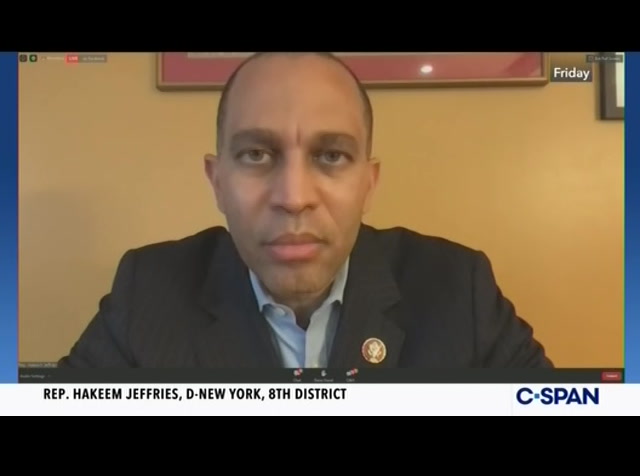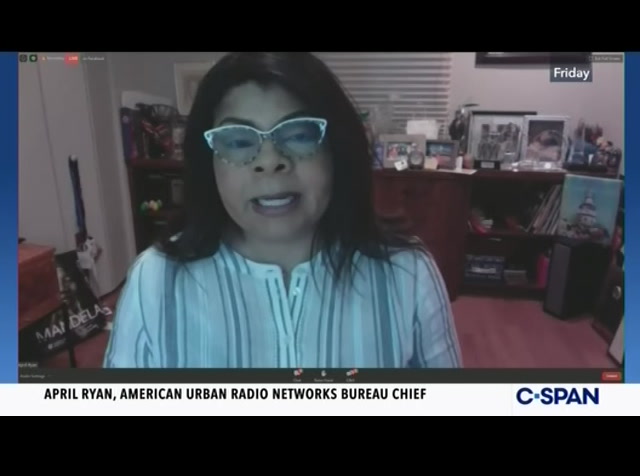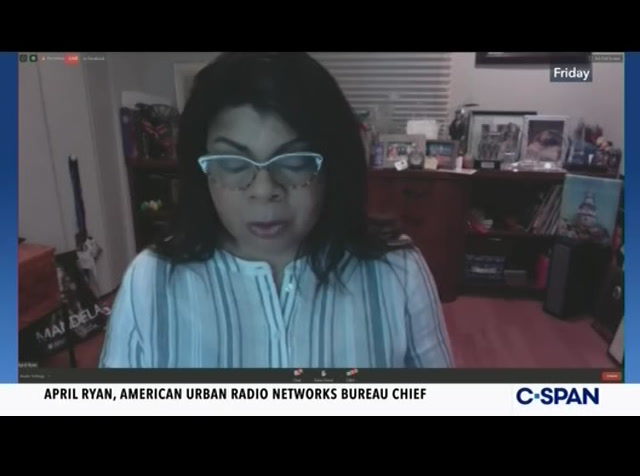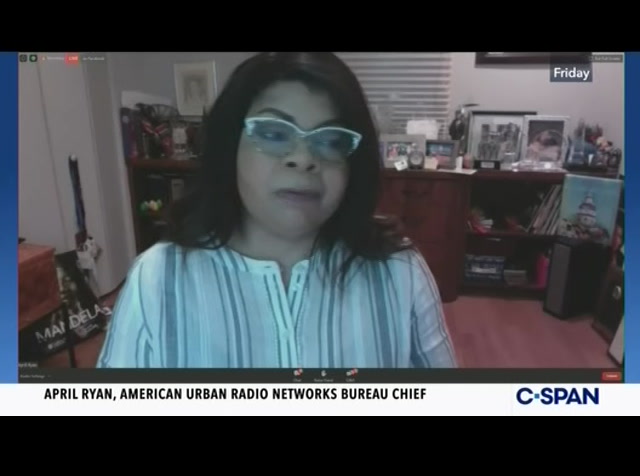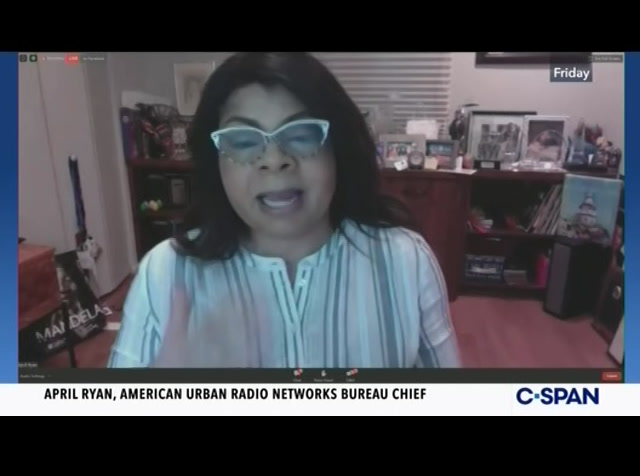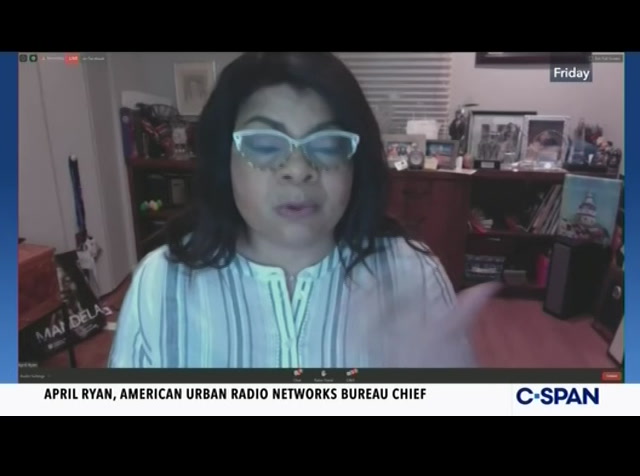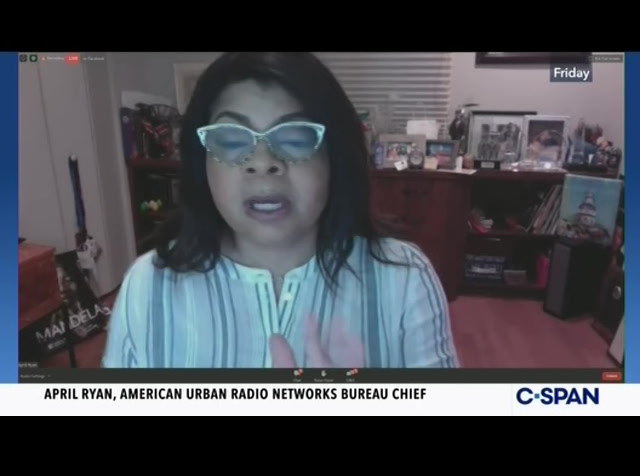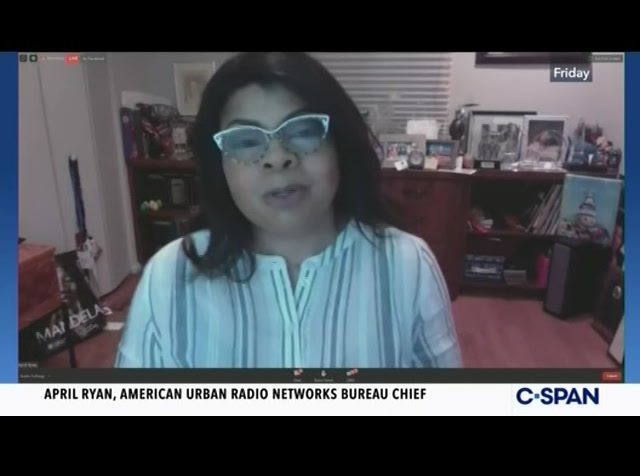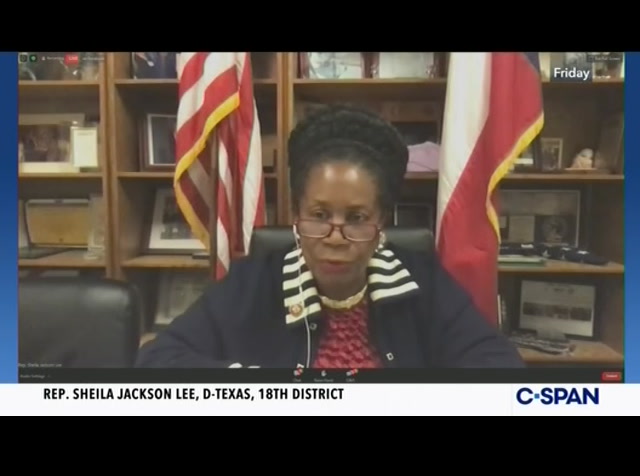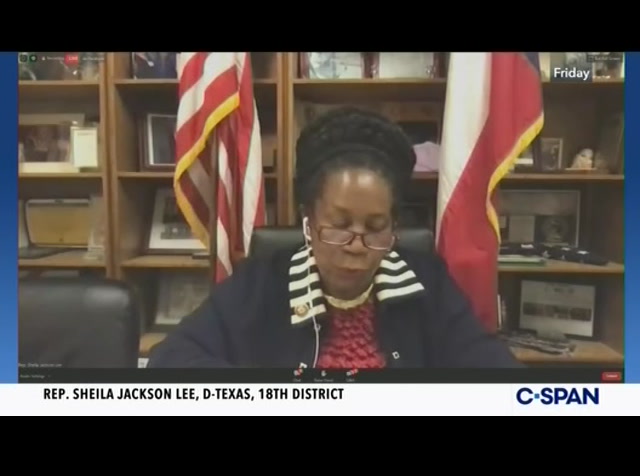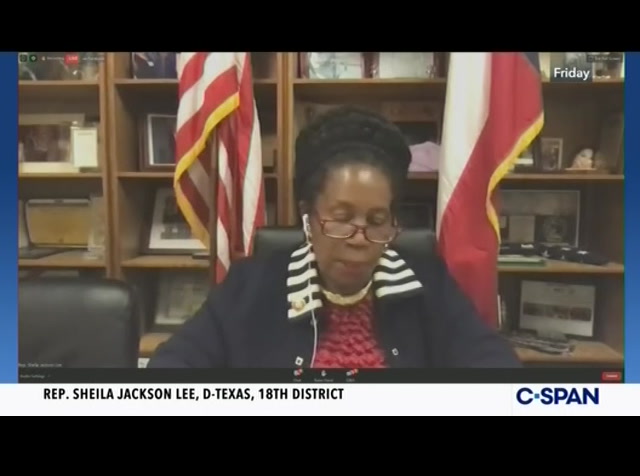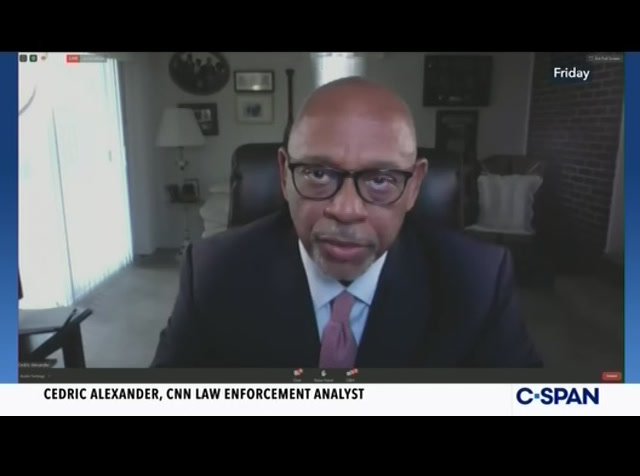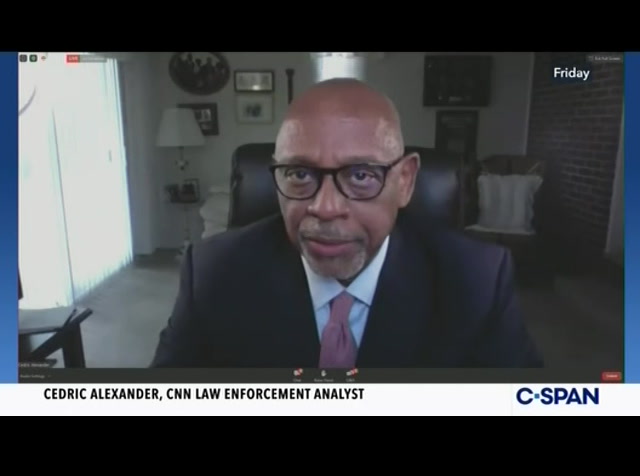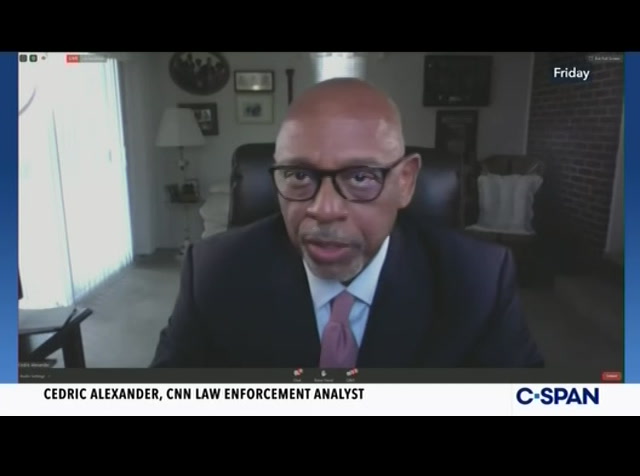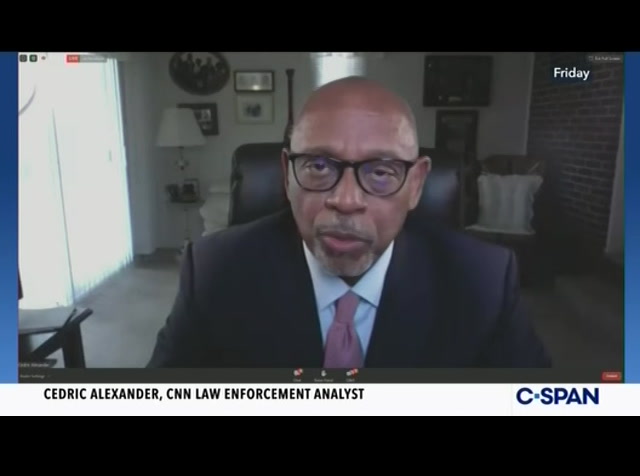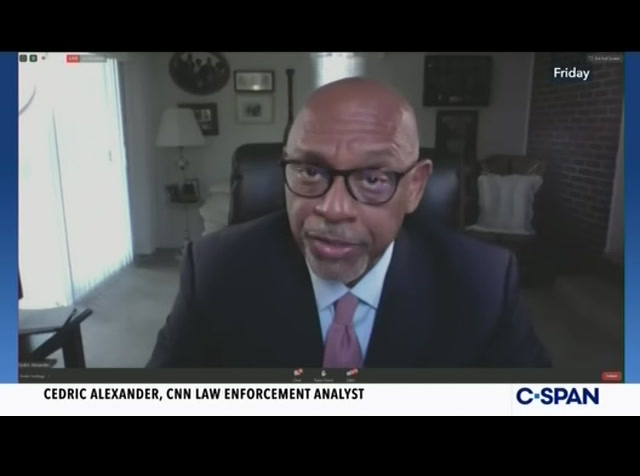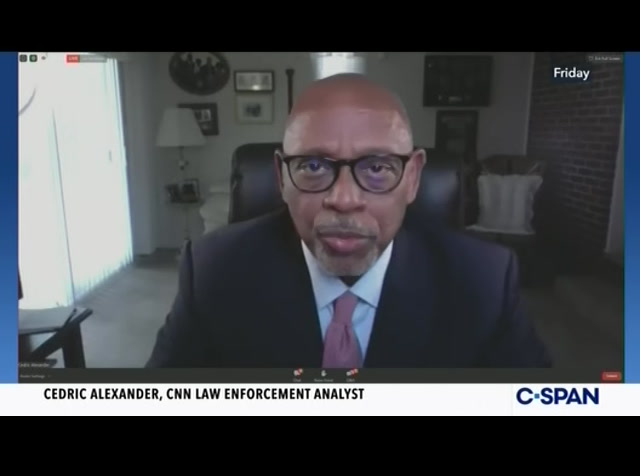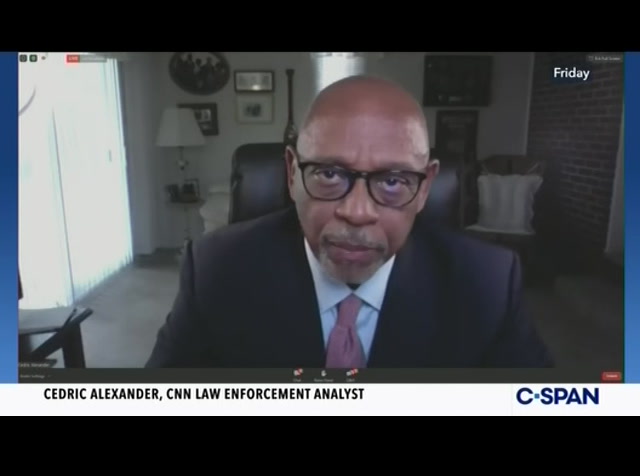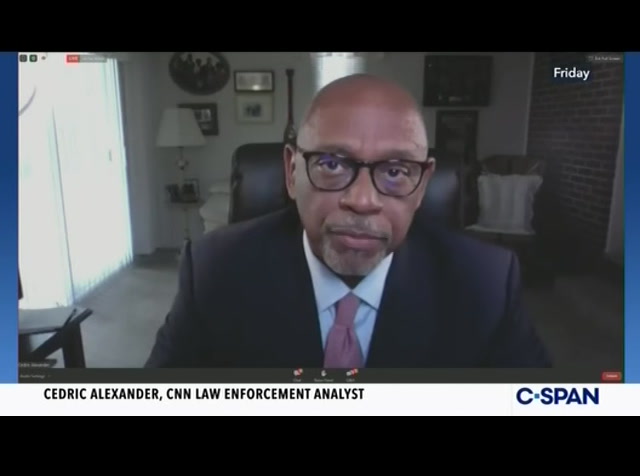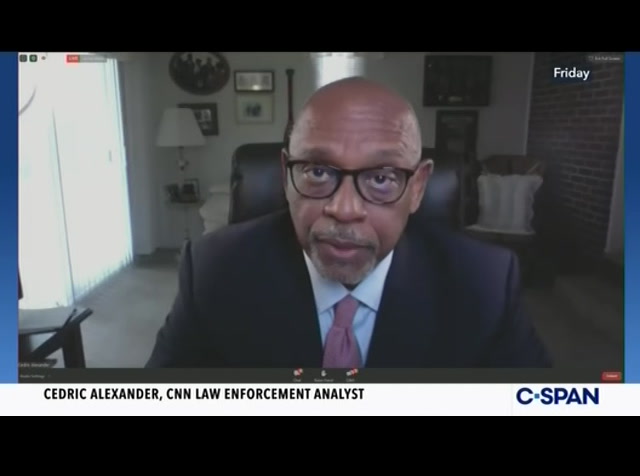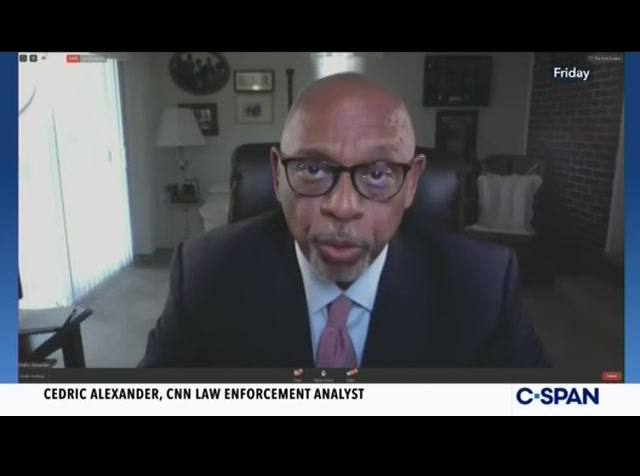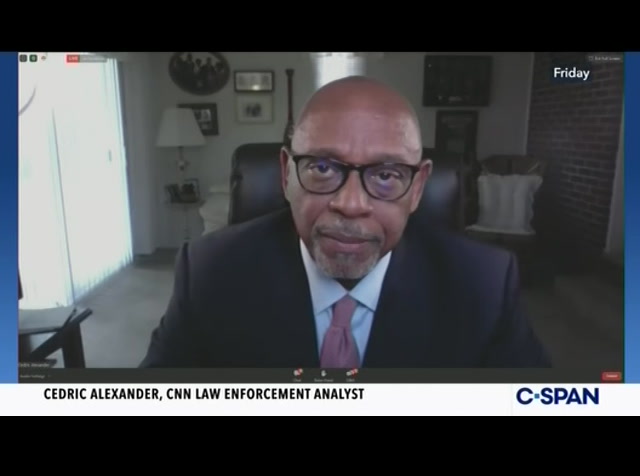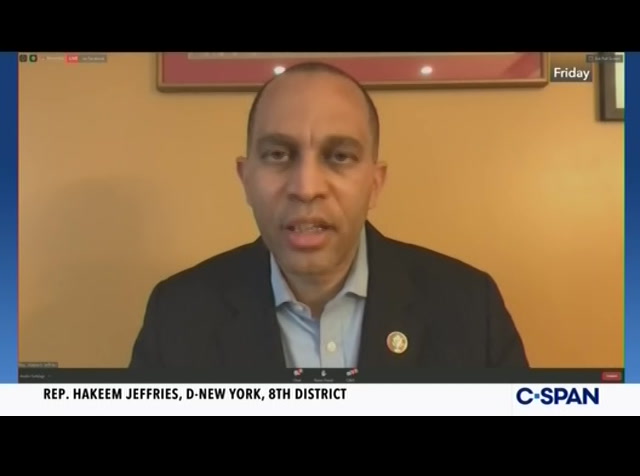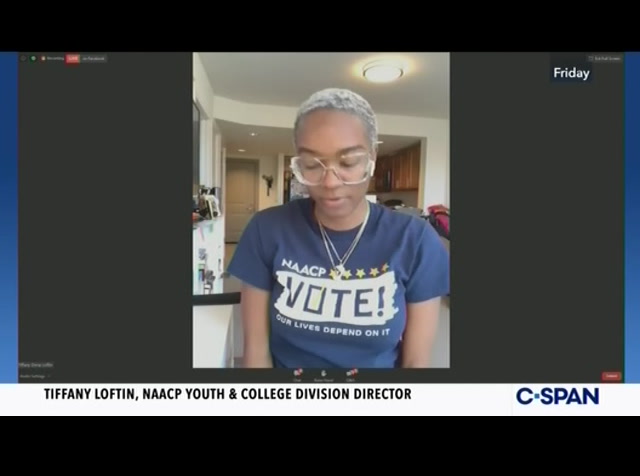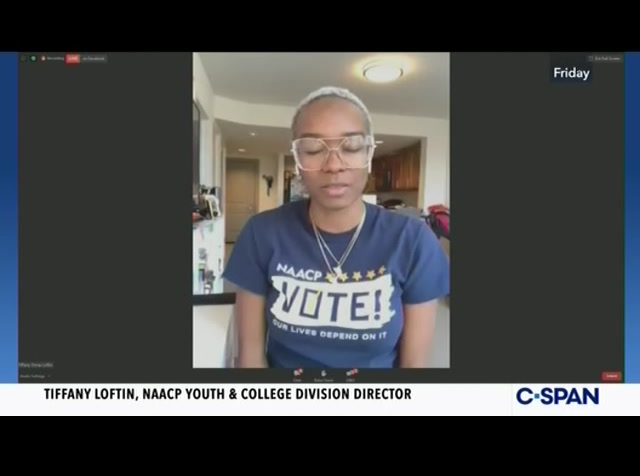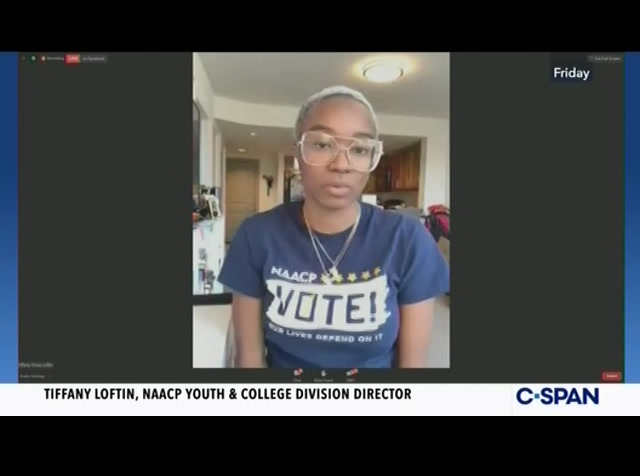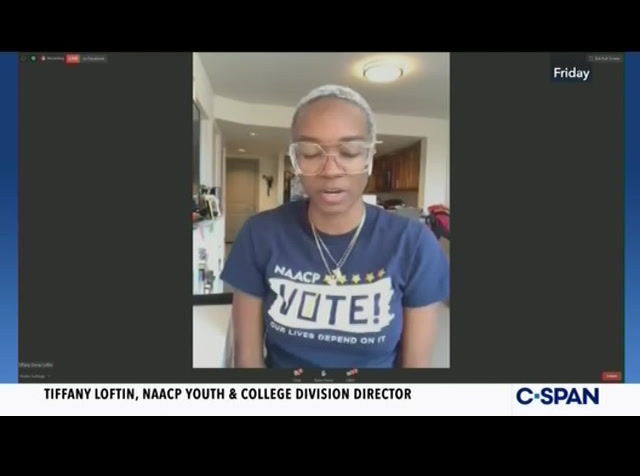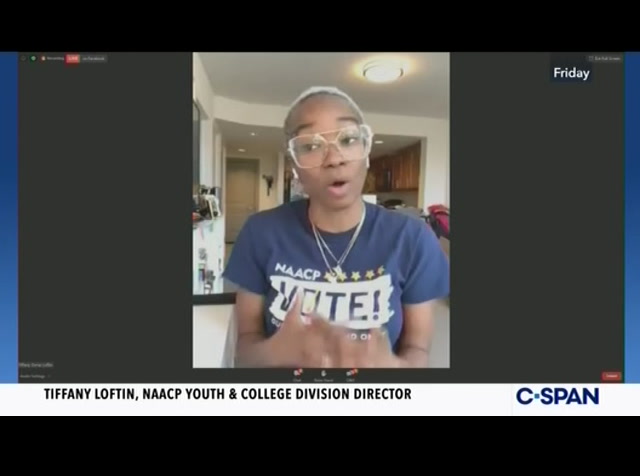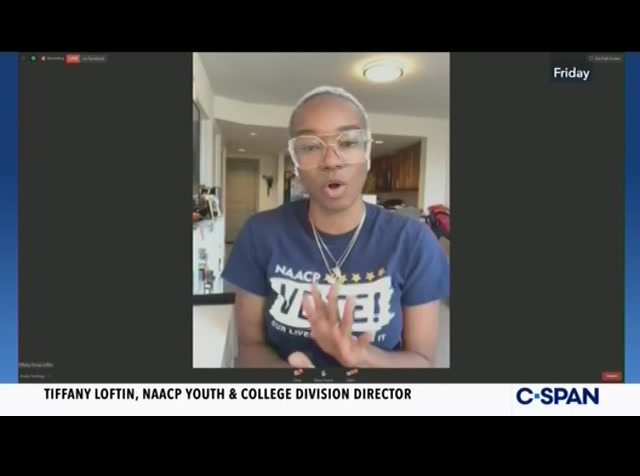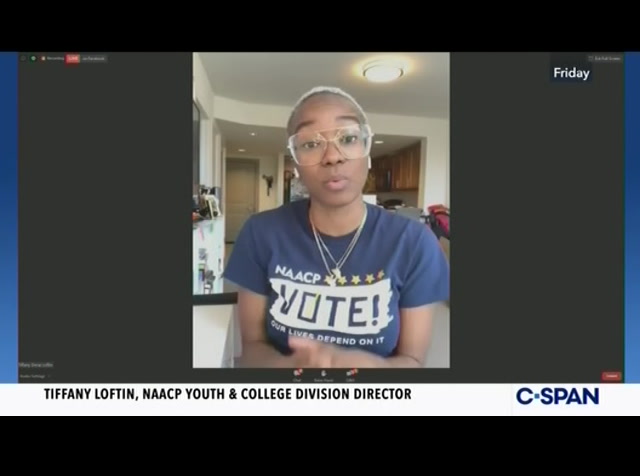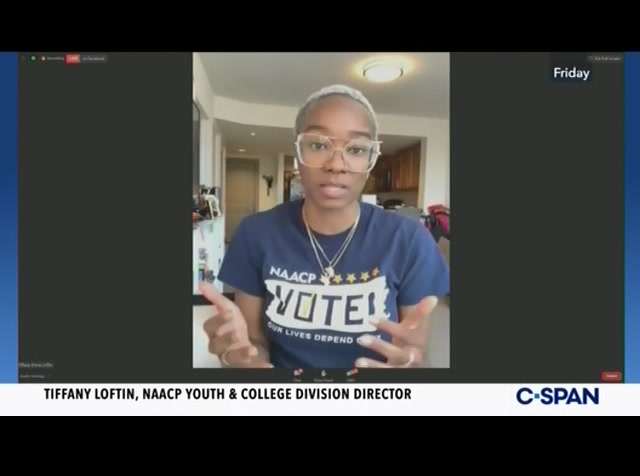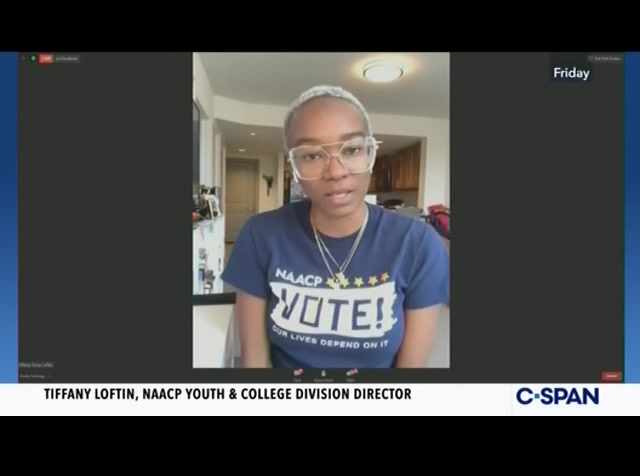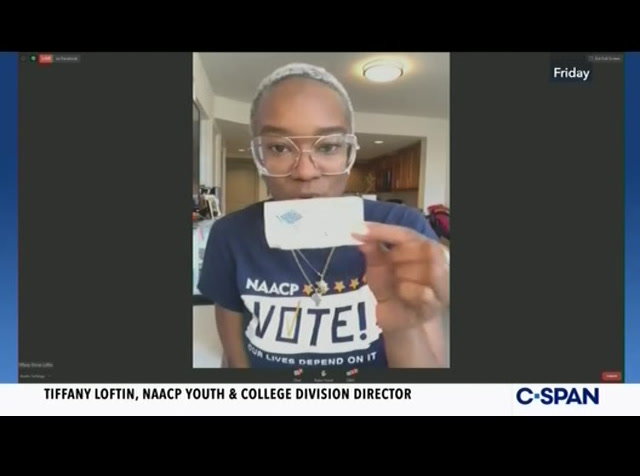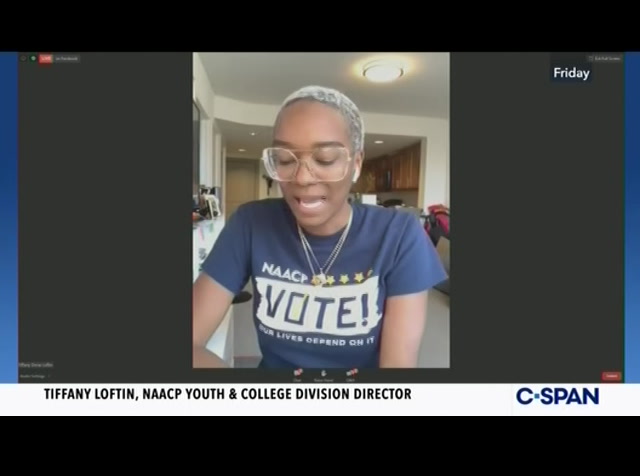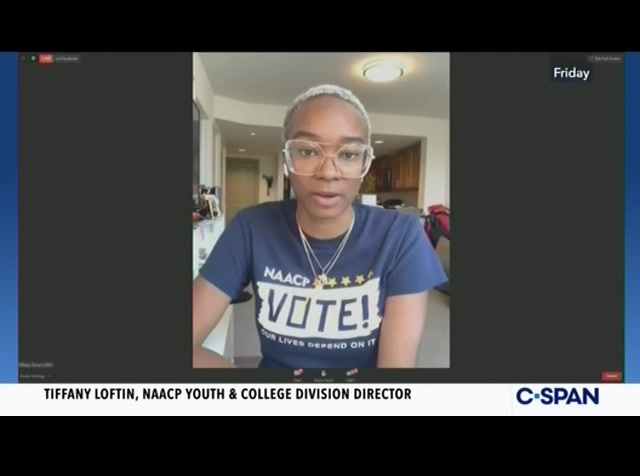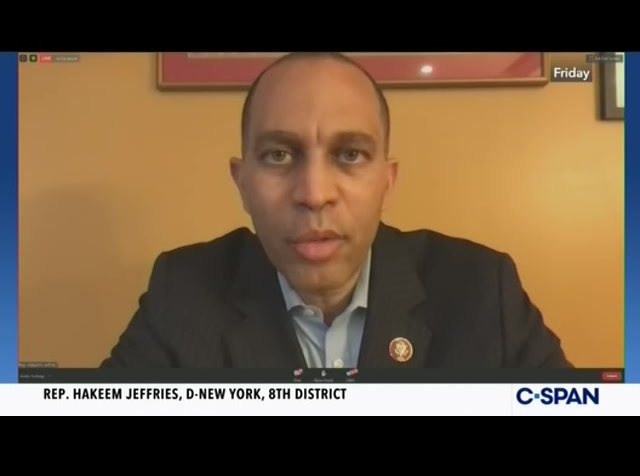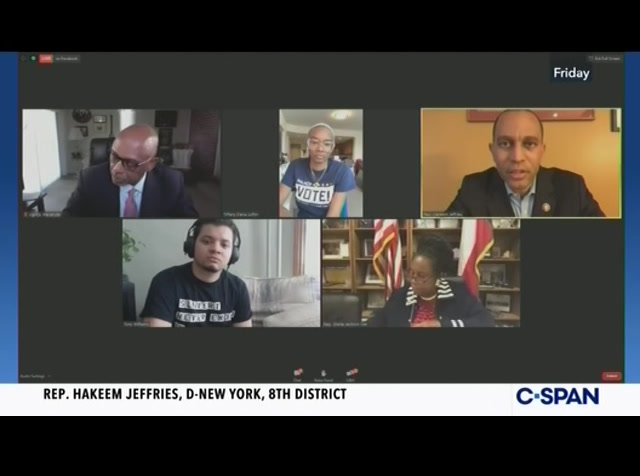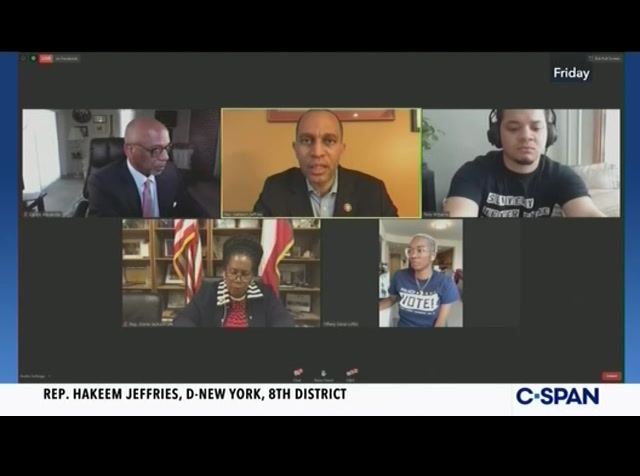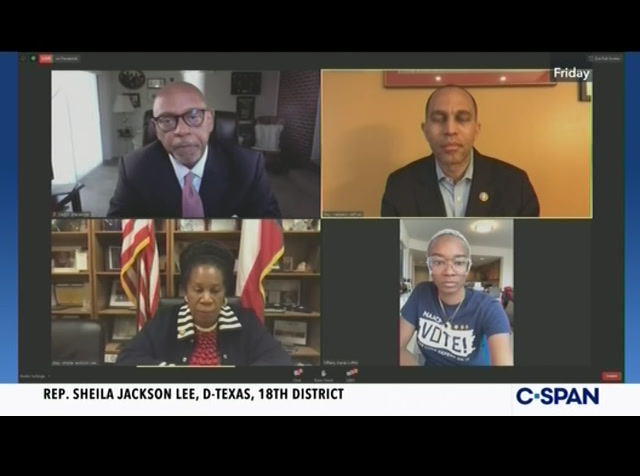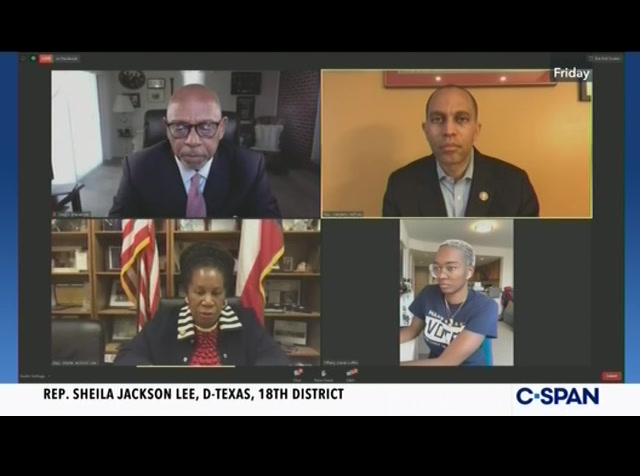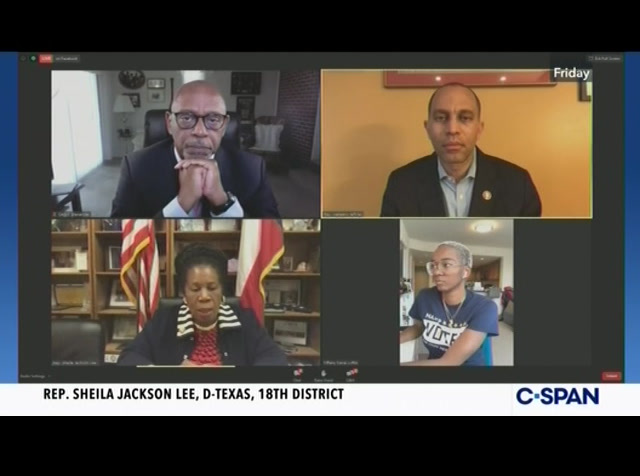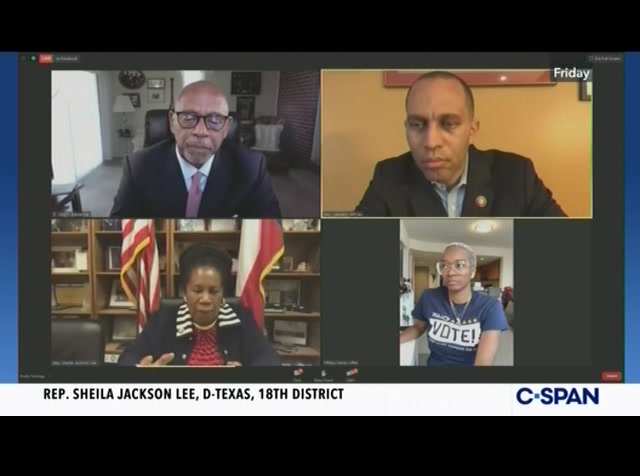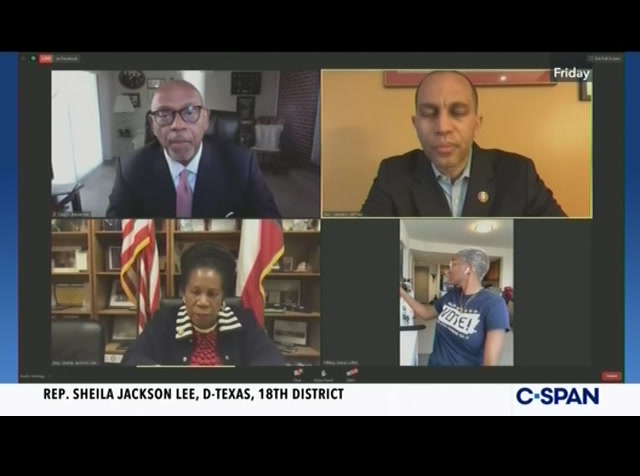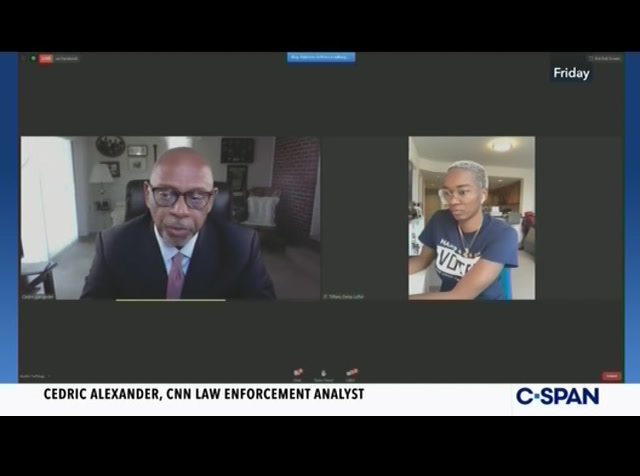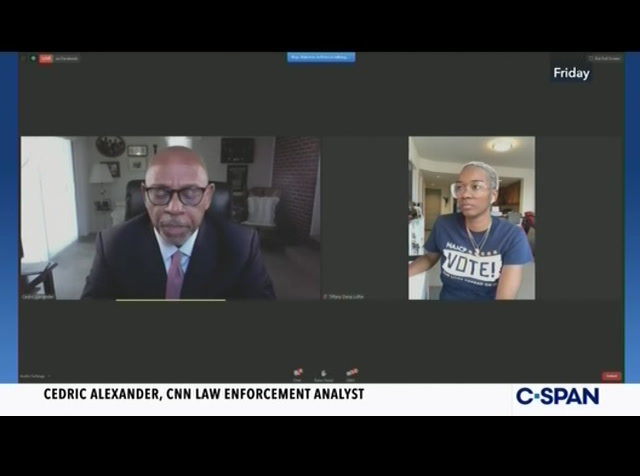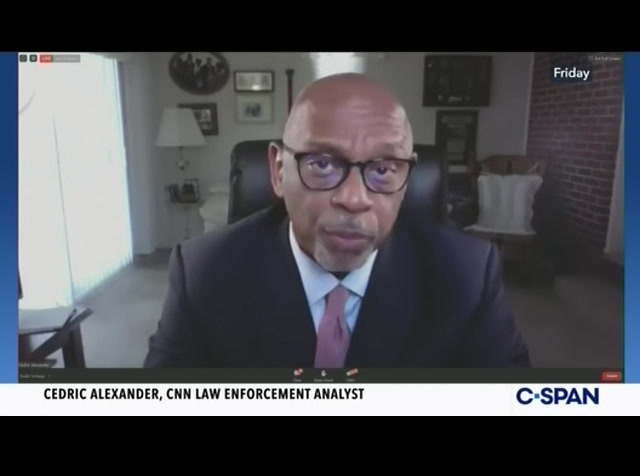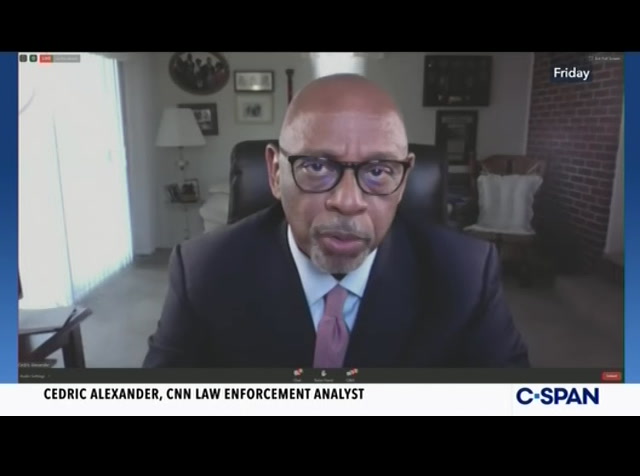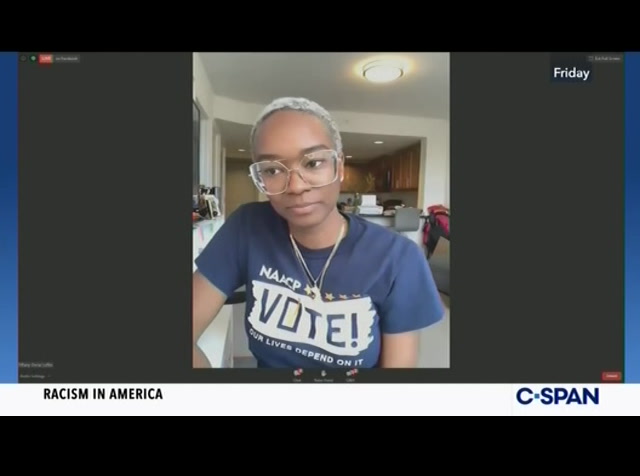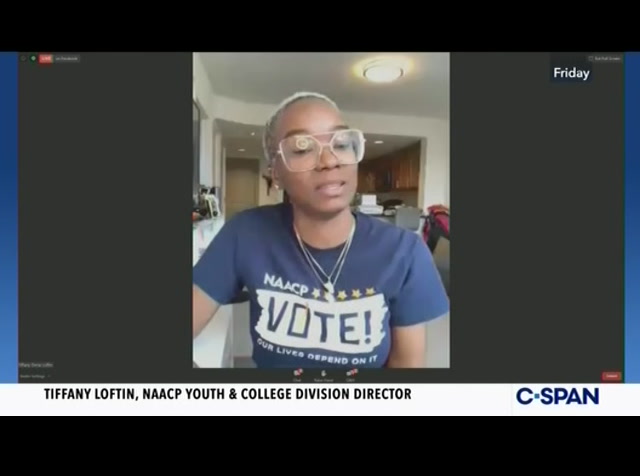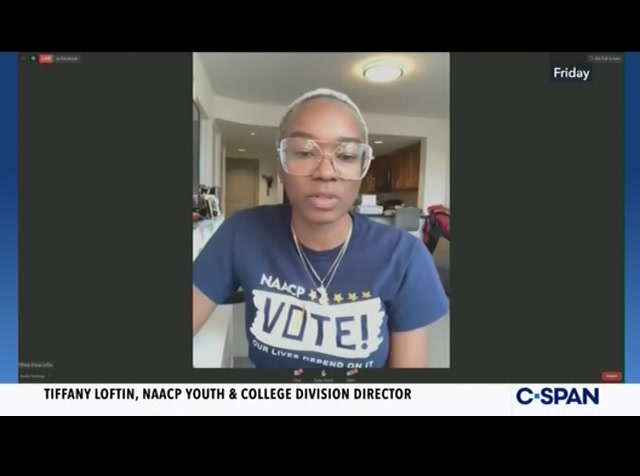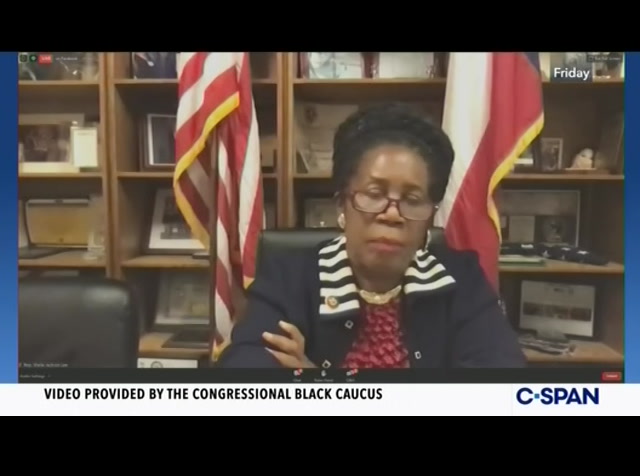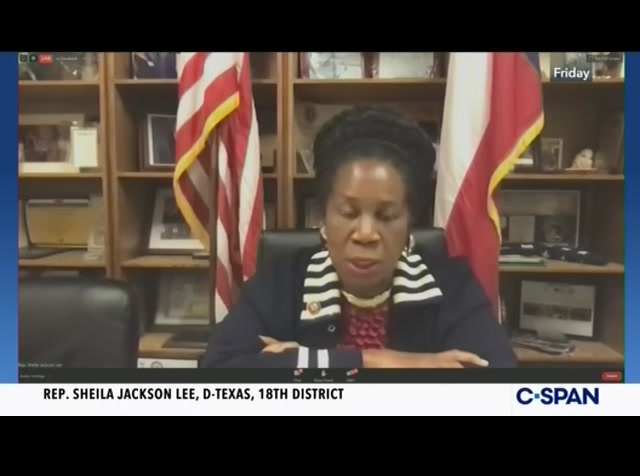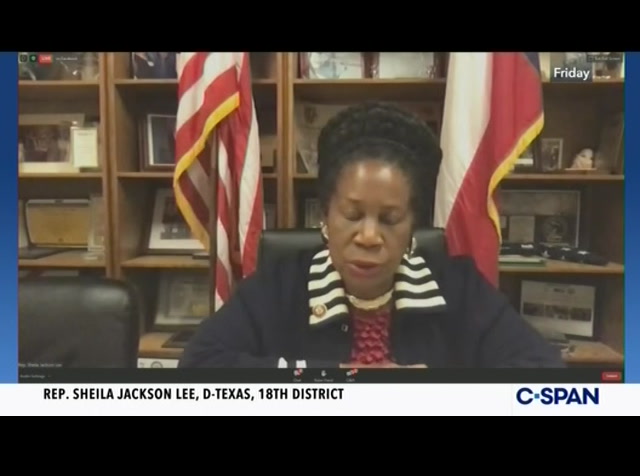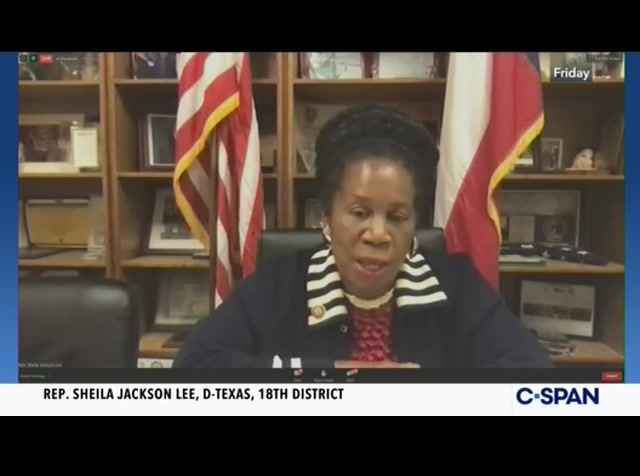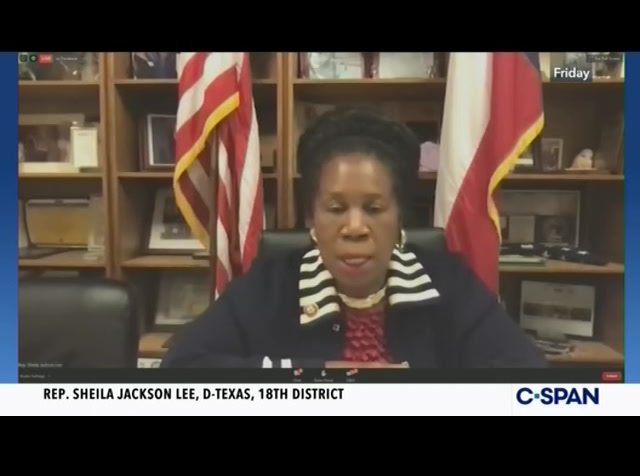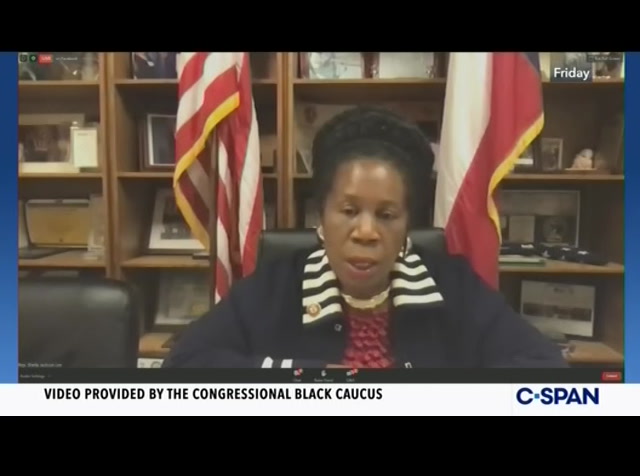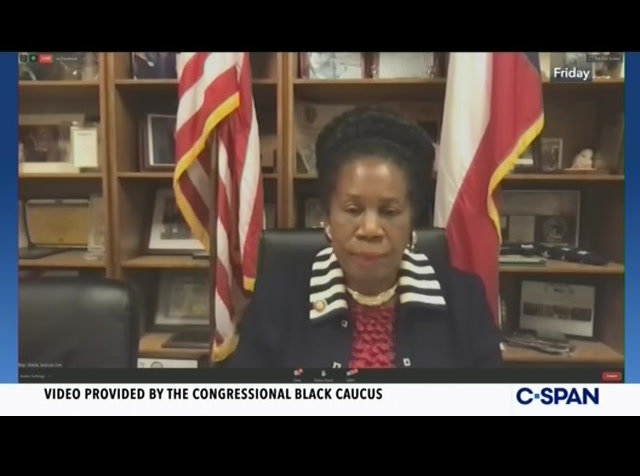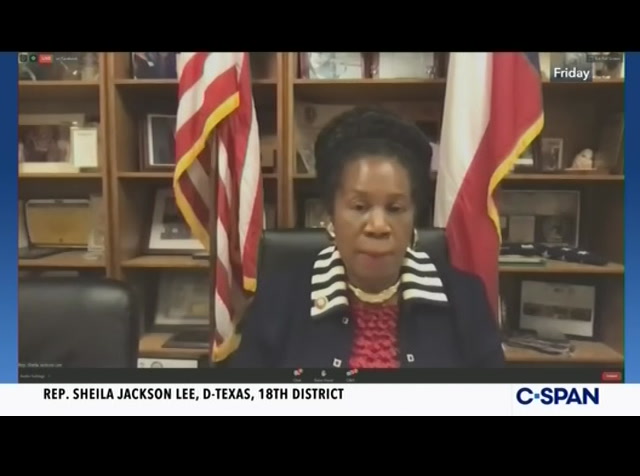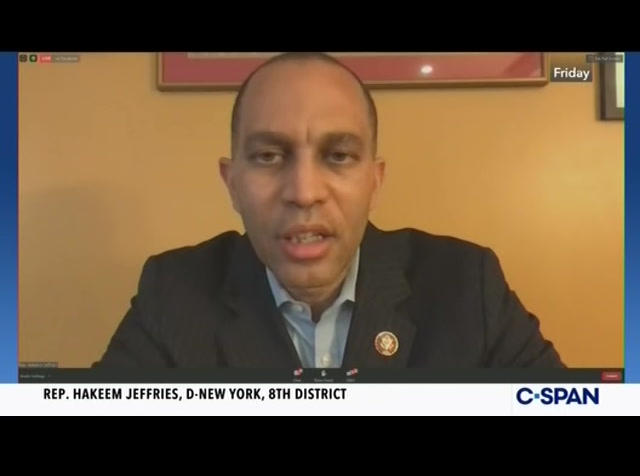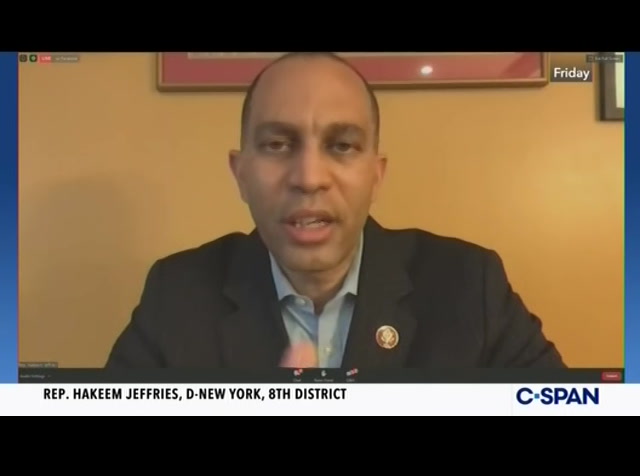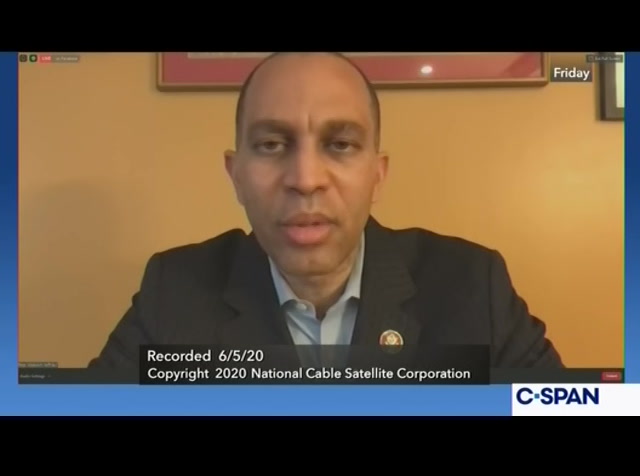tv Congressional Black Caucus Holds Town Hall on Race CSPAN June 7, 2020 5:24am-6:59am EDT
5:24 am
days of protest over the death of george floyd. joining the 90-minute conversation were community and racial justice activists as well as representatives from law enforcement and the media. >> good afternoon, everyone. i'm congressman hakeem jeffries here in the great state of new york. i'm proud to represent the eighth congressional district, otherwise known as the people's republic of brooklyn. i'm coming to you with other members of the congressional black uncaucus led by our fearless chairwoman karen bass and several distinguished members of the black caucus you'll be hearing from momentarily. thank you for joining us on this emergency town hall meeting, living while black in america, 401 years later after
5:25 am
our ancestors were first brought to the shores of america in shackles. we know that while we've come a long way in this country, we still have a long way to go. and we are living with the regular eas of slavery and jim row and racial compression that takes over every part of life and we've seen it the past several months in such a stark and striking fashion. covid-19 pandemic, a twin crisis, both a public health crisis and economic crisis has impacted everyone, but disproportionately impacted in an adverse fashion the african-american community. in terms of pain and suffering and economic dislocation and in terms of death. and then of course we're dealing with the continued
5:26 am
epidemic at the same time of police violence, police brutality, police abuse. all across the land, impacting every aspect of our lives. shopping while black. george employed. -- george floyd. sleeping while black, breonna taylor. jogging while black, ahmad arbery. the names are too numerous to mention. those tragedies are just a microcosm of what we confront in our communities on a daily basis. and we want to have a discussion about where we go from here. the congressional black caucus is working hard to put forth
5:27 am
the legislative package to respond to the moment that we re in and to finally bring some accountability and change to the manner in which our communities and every other community is policed in america because we know this has been a phenomenon that's been with us year after year, decade after eaked, century after century. i was struck by the fact as i conclude my opening observations, that i talked to my youngest son yesterday who was the one that brought me the video of george floyd being assassinated on a minneapolis street and wanted to go out and protest, which as a concerned father, i had hesitations about but knew it was the right thing to allow him to do as a young teenage african-american boy.
5:28 am
of course i had to remind him of certain things, make sure he as his school i.d., if he is harassed or talked to or mishandled in an inappropriate fashion, show restraint, even if the behavior is abusive or disrespectful because it could escalate in a manner he could lose his life. and then if he's being questioned, if they put a document in front of him, don't say anything or sign anything. why should i have to have that conversation with a young teenage african-american boy? and i know mothers and fathers and grandmothers and grandfathers are having that same conversation. it's a difficult thing to have to say but i knew the words that i had to say to him. why? because when i was growing up in brooklyn in the 198 0's and
5:29 am
1990's, my father said the xact same thing to me. and my grandfather said the exact same thing to my father when he was a teenage boy in in rc in the -- in newark the 1950's. this time will be different because of the young people who ave taken to the streets, we hear you, we see you, are you and we're going to make a change. it's my honor to yield to the distinguished gentle lady of the great state of texas, a leading member of the judiciary committee and homeland security committee and a champion for racial justice, sheila jackson-lee.
5:30 am
mr. chairman, thank you. i will remove my mask because i do it when i'm in the midst of our staff and to indicate, mr. chairman, of where we are in these calamities, these catastrophic incidences in our lives. let me thank our mighty chair, congresswoman karen bass and my colleagues who are with me, my sister, my brother and very important guest that we have with us. let me just thank ilhan omar and to hold up a v.i.p. badge that i wish i never had to see in my life. that is the document used yesterday when we joined the family of those in minneapolis and when i say that, the brothers and the sisters and extended family members in minneapolis to be able to mourn
5:31 am
as they go from there to north carolina and to houston, catastrophic because as chairman jeffries indicated, it follows into the insults that we have suffered in our most recent series of months. but it also is compounded by 110,000 dead from covid-19, the fact that the administration failed to both know and prepare created a heavy burden on those who already didn't have access to healthcare, african-americans. and when people rush to emergency rooms from the nation's public housing and from inner city neighborhoods or rural america, they were turned away. they were given an aspirin and turned away to die, black people who did not have the right care, medical care that the government, the federal
5:32 am
government should have been engaged in. so when we talk about living black in america, there is a compounding of things, not only did we have the circumstances that were recounted and breonna and armaud arbery and now, of course, the heinous killing, murder, slaughter of mr. floyd, but we can't even bird watch in central park because when we bird watch in central park, someone is going to say, i'm going to call the police and tell them a black man is attacking us. in the united states congress, areers of black caucus working every day to throw up and to stop between our amazing work in appropriations, our work on the judiciary committee and
5:33 am
just introduced h.r.7100, the george floyd law enforcement trust and integrity act that is going to deeply embed in its new form into deep changes in the psyche of policing, so let me just close, we are working very hard and will encourage commentary on h.r.40 to understand that the very basis on the nation was built backs of slaves, unpaid, that built cotton as king and we can't seem get rid of the disease of racism, covid-19 and racism. i close with these words, i hope we will engage on this, h.r.40 reparations, which if there ever is a time, it is now, because of the catastrophic reconstructing of how african-americans are treated, educationally, economically and beyond. listen to these words from a white host on a radio show, are white people supposed to be embarrassed because of how we
5:34 am
are born, speaking to white privilege. are we supposed to be in barents -- embarrassed if our parents got married before we got born, they stayed together with the family through good and bad times as well. are we supposed to be embarrassed because our dads worked overtime so we would have enough, are we supposed to be embarrassed that we don't roam the streets because our parents didn't let us. is this something to be ashamed of, a strong nuclear family, a strong work ethic something to be embarrassed, privilege, is working hard out of poverty to to the rung above and pass it on to your children. with resupposed to be embarrassed, do we have a nation within a nation, are these people occupiers and others occupied, are we talking about slavery in 2020? if we do not stand solidly with each other and face goodwill and good hearted americans that this is the time to save america, i
5:35 am
believe that we will as well have missed our opportunity. so i thank you and i'm delighted to be part of this and i'm delighted now even more so to yield to my sister congresswoman representative presley for opening remarks. >> thank you. first before i begin, i just want to center breonna taylor who was shot eight times and murdered, a front line essential worker whose birthday would have been today. she would have turned 27 years old. no more hashtags. george floyd, breonna taylor, armaud arbery, they should be trending based upon their contributions to community, to the world discovering a cure for cancer. we learned today from george floyd's second grade teacher that he had written in a school essay and asked what did he want to be when he grew up, he said a supreme court justice.
5:36 am
i'm just returning from minneapolis where i was humbled to join the floyd family and many members of the congressional black caucus including my dear sister, representative jackson lee who just spoke, and, of course, my ilhan omar inice her city there to witness previously for congressional black caucus visit, the black brilliance of the twin cities. i so deeply wish that the trip i took yesterday i did not have to take. i so deeply wish this man was still alive. he should still be alive. and in a more just america, george floyd would be alive. they would all be alive. i spent time with organizers who have dedicated their lives to the pursuit of racial justice and as i'm looking up our organizers, i want to just
5:37 am
underscore a point i have been making recently clarifying for some that just the fact of the matter for everyone who is participating in this town hall, our organizers, our activists represent a long line of organizing and activism and table shaking and peaceful protesting demonstration all while holding space for our righteous rage and demanding radical change. our organizers, our community builders are not destroyers. undermines seek to the narrative and will not allow it to happen. it always feels good to travel from massachusetts to minneapolis,al although i wish i did not have to do it on this occasion and for this reason. my time spent there in community
5:38 am
visiting thriving black businesses, eating in black-owned restaurants reminds me that until we fully dismantle these systems of oppression, all of our lives are at risk. what are we calling for, because the protesting and the demonstrating, the blueprint of the civil rights movement which we are still in, no book end, is to organize, mobilize and legislate. there will be unrest in our streets for as long as there is unrest in our lives. so we are calling for deep lasting structural legislated change. the death, destruction, denial of black people and our humanity is not new. our lives have been devalued and our pain has been delegitimized for far too long.
5:39 am
to offer more historical contexasizing to this moment, this week marks the near century anniversary of this massacre in the greenwood district, destroying the country's wealthiest black community and robbing it of at least 300 lives. the massacre was one of the worst incidence of racist violence in our history and one of the government denied for decades. the same way it always does, the abuses that we as black folks suffer. how we document these abuses has changed, but the instinct to deny our experiences remains. notably was the government's toponse to reparation redlining that guaranteed greenwood's permanent demise. we are experiencing a crisis within a crisis that is decimating our communities and we must respond and act accordingly.
5:40 am
as a black woman married to a black man raising a black child, i will very much would like to pass on to my 11-year-old daughter generational wisdom, generational wealth, generational joy instead of generational debt, trauma and fear. i would love for her to live a life free from fear, now, i understand the pain of people taking to the streets. in texas, in minnesota, in massachusetts, folks want to be seen. they want to be heard because for too long black and brown bodies have been profiled, surveyed, policeed, lynched, choked, brutalized and murdered at the hands of police officers with callous disregard, with
5:41 am
impunity and without any retribution or consequences. we cannot allow these fatal injustices to go unchecked any longer. congress needs to send a clear message and act now, there can be truly no justice for george floyd or breonna taylor or any other human beings who have been killed by law enforcement for in a just world, they would still be here. they would still be alive. there, however, must be accountability and that means enacting uniform standards and restrictions on the use of force, true oversight and transparency and the elimination of special protections like qualified immunity that allow the police to use a badge as a shield from accountability in cases of brutality and abuse. we cannot give into false choices pinning our safety and freedoms against one another, whether an unlawful traffic
5:42 am
stop, search, or assault, every single abuse must be accounted for. so in the same way that policymakers have legislated and codified our hurt and harm for generations, we must now codify our healing and our justice and our law making. we must now look to enact systemic reforms that match the scale and scope of these systemic injustices that we have faced for centuries. this will not be easy, but i know that with your partnership, we can realize justice for all. and now the chant from our 10,000 strong black lives matter protest here in boston that was organized by one of our freedom fighters, monica, she runs an organization called violence in boston and said all my life i had to fight and we gonna be all
5:43 am
right. and with that, i yield to my sister representative ilhan omar. thank you, congresswoman presley, thank you all for this great opportunity for us to convene, to our wonderful chairwoman for calling on us to come together to have this conversation, this really important conversation, and to sheila jackson lee and all of the members of the congressional black caucus who joined us yesterday as our community memorialized the life and the contributions and the hurt, that the death of george floyd has brought not only to minneapolis but to our nation.
5:44 am
i join you from minneapolis, minnesota, the sixth congressional district. yesterday, we held a town hall conversation with our community organizers. black folks, young, queer, as we joined in a conversation where we had our mayors, our governors, the two senators that represent minnesota federally, the state representative, city council members. and where we all sat and listened to the voices of the community to tell us what the devastation police brutality has caused in our community. what social and economic neglect has done to the black lives in
5:45 am
minneapolis and in minnesota. and what we should be doing as --ders who are interested entrusted to enact laws that ultimately uplift all of us. it has been 11 days since we lost george floyd due to another senseless act of racism by the hands of our police officers. the latest example of police brutality and excessive force has caused deep but not unfamiliar pain. from slavery, to lynching, to jim crow, black people in this country have been subjected to dehumanization since before this country's founding. and as a black immigrant, i center myself in those voices and in that history, as i move in this space of actively fighting for justice, for all of
5:46 am
us. right now, we are facing two pandemics, the coronavirus and injustice. both pandemics are disproportionately killing black americans. we know that being black in america makes you live by a different set of rules. far too many times, we've seen black men and black women be brutalized and killed by law enforcement with no consequences. you are almost 30 years route -- removed from the rodney king incident and yet black people are still facing these injustices. we are tired and frustrated that we keep finding ourselves in these positions. and so today, let this be the first step to healing. we all have a responsibility to
5:47 am
implement real, systematic, and tangible criminal justice reforms on a national level. but that work also needs to get done on a municipal and state level. i'm so glad my colleagues on the congressional black caucus are taking the lead as we push for bold action that will create police accountability, and that will rid us of the social and economic neglect that many of our communities have faced. our chance to dismantle the systematic racism that exists within our criminal justice system is real. so, today, we not only demonstrate and organize, but we also have a mandate to legislate.
5:48 am
and i'm so glad that in this moment of hurt, in this moment of pain, that there is a joining of many voices across our country, that finally are recognizing that if we not only make the kind of real lasting changes we need to make, then we return to the same place. but we also have to be vigilant in the policies that we implement. because we know that a few years back, when the movement for black lives began, across state houses, there were policies that were popping up to criminalize
5:49 am
our right to protest. so as we fight for justice, we have to make sure that we are also systematically fighting policies that will be proposed to set us back. with that, i would like to recognize and introduce a young man who has been on the front lines in our community organizing for justice. tony williams is a black community organizer from minneapolis, minnesota. over the past five years, he has been working with local groups, mpb 150 and reclaim the block, in the twin cities. he's a graduate of santa clara university, and he is also a prolific musician, broadcaster and artist.
5:50 am
tony and i have spent many nights in an encampment that was set as a fourth precinct over north minneapolis, when the death of jamar clark in the hands of police officers, who were called to respond a need, and in return, took the life of a community member. so i look forward to hearing what he will share with us about the lives of black lives in minnesota, minneapolis. tony? >> thank you so much, representative omar. i'm speaking to you all today from minneapolis where we are subsumed with grief and righteous rage. and understanding that this moment needs to be the moment that we turn away from the systems of domination that have constrained us as black americans for so long. i want to tell you a story to start off. it was a warm july day, and there were a group of black
5:51 am
youth gathering on the north side of our city. they were attacked by a group of police officers and brutally beaten. later that same night, a black youth was in the mills district of our city, and was attacked and beaten by police officer, who tried to pull his gun on the youth and shoot him. the youth was able to wrestle the officers gun away, and rather than choosing to kill the officer, he threw the gun on the ground and ran away. the words from the minneapolis police department was that the youth had started the incident. and that was the story in the press the next day, that a group of multiracial minneapolis citizens had seen the truth, had seen that the officer was the one who instigated the situation. the naacp gathered that night, the next night, and advocated for true police reform in minneapolis. they said we need more diversity
5:52 am
in our police officers, we need more black women at the front of our police department and that we need better policies and de-escalation practices. the changes never came about. the story i'm telling you took place in 1922. we are sitting at the end of a long arc of history of a long and deep failure to secure police reform. here in minneapolis, we just passed the 150th anniversary of the minneapolis police department's establishment, a group of community members put together this report, enough is year performance review of the police department. in order to take a look at the history of our department, the presence of our department, and where we are going. you can find it on npd150.com. i highly recommend everyone check it out. when you look at the history of
5:53 am
the police department, especially in minneapolis, there is a very clear pattern that begins to emerge. that pattern is one of protest, one of brutality, one of protest, one of reform, and one of stagnation and backsliding. in almost every incident of police brutality in minnesota's history, of which there are hundreds, it starts out where a system of racism and domination allows a police officer to take the life of a person, and usually a black or native person. the community rises up in righteous outrage and response, sometimes peacefully, sometimes not. elected officials, local, state, and national proposed reform and demand for justice to be taken. these reforms can look like diversity initiatives, de-escalation initiatives, mental health training, body body cameras, you name it. universally, we see that it becomes completely ineffective
5:54 am
or are undone by the very police departments who were supposed to be constrained by them. the cycle repeats, the pace of change slackens, and everything goes back to business as usual, until the next atrocity occurs. myself, i myself have been involved in a movement for black lives in minneapolis for the last five years. just in that time, i've seen five high-profile police murders inner-city. police murders in our city. the murder of jamar clark by the minneapolis police department. the murder of another in neighboring falcon heights. the murder of travis jordan, and thurman blendon, and justine damond in minneapolis. i'm here to say that we are tired. we have tried reform. we have tried having conversations with officers. president obama's department of justice instituted a 21st century policing program in minneapolis and propped it up as a model of effective community policing the whole country could follow. it didn't work.
5:55 am
we had police chiefs, our first queer chief woman of color and our first black chief of all time over the last five years and say they were capable of reforming the system. they have failed. and that's why i think for the first time in our city's history, we are seeing community members on the ground say "no more reform, no more de-escalation, no more critical incident training, no more body cameras, no more use of force policies." it's time for us to abolish the police. our communities have gone systemically this invested in since our arrival in america 401 years ago, and we know that the reasons are community is because we don't have the resources we need to thrive. there is no reason we should be
5:56 am
responding to mental health crises in our community driven by under resourcing and generations of trauma by responding with paramilitary white militarized enforcers from outside of our communities. we understand here in minneapolis, and protesters have been calling for the last week, that we need a better safety model here. and our elected officials are finally starting to listen. we have asked time and time again, we have advocated peacefully, we have gone to the ballot box, we have gone to city council meetings. we've gone to town halls. and we've said that the time is coming for us to find a new way of creating safety for our communities and our city. and now, we are saying the time has come. it is time for us to re-examine what public safety looks like in america, and create a future that is truly safe for all americans, including black americans. black lives matter. thank you.
5:57 am
>> thank you so much for sharing with us your experiences, your perspective, and your passion. it is now my honor and privilege to introduce someone who is no stranger to all of us. she is an award-winning journalist. she has been a white house correspondent since the clinton administration. she frequently speaks truth to power, questions power, and reports on it in an authentic and distinguished and intellectually robust fashion. she is a native of baltimore. she represents us as african-americans incredibly well. and now she will speak on the importance of black journalism
5:58 am
during this moment of pandemic, this moment of pain, this moment of physical distancing, and this moment of police violence and injustice. i yield now to april ryan. >> thank you. it is an honor to be with you today in this moment, this historic moment, and this discussion is so very important. one of the main reasons i believe that this is an important moment for those on the call and those watching, is we need the conversation to happen. and we need action. we have been talking for over 401 years. and our voices have not been heard. now we are bringing in the mix of the media. and as a black woman from baltimore, who happens to be a journalist, i can no longer sit on the sidelines and just write the story. we are now part of the story.
5:59 am
and we must be heard and we must speak up. at this moment in time, it is hard to watch my colleagues being taken into custody, on national television, threatened and beaten on the streets of not only minneapolis, minnesota, but across the nation. it is hard to watch black reporters being talked down to like dogs at the white house. during covid as well as this moment that we are facing. we have faced this moment before. we have watched in the last 10 to 15 years, the accountability of these videos starting with eric garner, freddie gray, walter scott, trayvon martin and more. we heard trayvon martin. going to ferguson, we had the
6:00 am
tanks and the teargas. and we are back at this moment. this moment, we are seeing reporters teargas. we are seeing reporters beaten. we are the first line of reporting, whether we are black, brown, jew, gentile. we are the first line of reporting to make sure the story is told for accountability. and now that is taken away from us. it reminds me of something said by president donald john trump at the beginning of this administration, when he had police officers flanked behind him, talking about, don't be so nice. he was talking about don't be so nice when you are bringing into custody immigrants, and those from the gang ms 13. that don't be so nice reverberates now in the streets of minneapolis, in the streets of chicago, in the streets of new york. it reverberates everywhere. as we've talked to so many people across the nation, our sources, many people are saying in the civil rights community,
6:01 am
from the naacp, to the urban league, to reverend al sharpton, it starts from the top. the embers have been stoked against the press. this president has considered us the enemy of the people. we are the first line of accountability. we were there when he held his bible backwards at st. john's episcopal church. and moved a peaceful crowd, teargas to them so he could stand to take a picture. we were there to not only account what he did, but to see what the national guard was doing to protesters, peaceful protesters, as well as reporters. i don't want to dwell on this so much because i want to go back to history like everyone is going to. a documento back to from the 1960's, 1968, because of violence in the streets after
6:02 am
dr. king's death. because people were trying to understand why was this happening, how can we fix this issue? at issue, i want to talk about the current commission report, that panel came up with this report that seems to not make any difference at this moment. people have forgotten one piece of the report. chapter 15, the news media and the disorders. and if you bear with me for one moment, the chapter starts off, "in his charge to the commission, the president asked what effect does the mass media have on the riots? the commission determined the answer to the president's question did not lie solely in the performance of the press and broadcasters reporting the riots. our analysis had to consider also the overall treatment by the media of the negro ghettos, racial attitudes and poverty day by day, and month by month, year
6:03 am
in and year out. i'm going to go further down. basically, the recommendation at that time, bear with me, if i can scroll down a little bit more, from this report. the conclusion of the report talked about improving the coordination with police and reporting riot news through advanced planning and cooperate with the police in the designation of police information officers, establishment of information centers and the development of mutually acceptable guidelines for riot reporting, and the conduct of media personnel. it also talked about accelerating efforts to ensure accurate and responsible reporting of poc and racial news through adaptation by all newsgathering organizations of
6:04 am
stringent internal staff guidelines. there are guidelines that were put forth over 50 years ago. there were guidelines put forth over 50 years ago. why aren't they being followed now? it is a rough-and-tumble game, and this is not a game. this is life and death. the minority media, are there to report what is happening in our community. and that's one thing also that the current commission report talks about, that we are needed in these spaces. these unique places, to be able to report on what is happening in our community. and now we are being thwarted. we are being beaten. we are not allowed to do our job. and the framework, the blueprint is there. and it is not being followed. with that said, it hurts my heart to watch my fellow journalists, my colleagues, who are members of the state, my colleagues who are white
6:05 am
founding fathers put into the constitution, and the first amendment, not knowing we would be here, not knowing there would would be these reporters that have been brutalized during this critical moment in history. that we are part of the fourth amendment, and we thank you so much for allowing me to have a voice for the voiceless, who are out on the front lines right now trying to cover the story for us, to hold accountable this president, and all that need to deal with police brutality and beyond in this nation. thank you for my time. >> thank you so very much, april, for really focusing on the burdens and the challenges that you have faced and others
6:06 am
in a very important, valuable voice for the african-american and black community. the descendents of slaves who have carried this burden for so very long. let me thank tony as well for a very powerful -- i guess saying the word powerful sometimes falls flat when people's lives have been lost, to be able say that someone's words are powerful. all we want is to be free with peace and dignity in this nation, and treated with the dignity that is deserving of someone who has literally built this country. dr. alexander, i know that you are well aware of this journey. we have taken it together. we have worked together. you have appeared before the judiciary committee on these very crucial issues. i don't know why we are in the
6:07 am
deja vu, still going around the same circle, but i'm very grateful that you have continued to be engaged in the issues of policing and police reform, systemic change is needed. catastrophic change is needed. as i introduce you, let me reinforce the fact that they are young men and women like tony, who have said to this nation, nothing less than what dr. king said, why they cannot wait. dr. alexander, we are glad to have you, serving as the transportation security administration. you have served as a deputy commissioner of the new york state division, criminal justice services, chief of police in the rochester police department and held several leadership roles at the university psychiatry in new york. dr. alexander began his career in 1977, and was a law enforcement officer in florida for 15 years. he's been a man on the beat.
6:08 am
and he is the former national president of the national organization of black law enforcement executives. and i have met him through those activities. and as well, he is now a law enforcement analyst for cnn. dr. alexander, i want to welcome you. it is good to see a friend. and we thank you very much for participating with us here today. thank you again. welcome. this is a tough time. >> it is a very difficult time. thank you for having me, to the entire congressional black caucus. it is great to see you as well, too, congresswoman jackson lee. historically, when we think about policing in this country, we really have to go back to the beginning of policing. it has always been a challenge, right from the beginning, at the inception of police in this country. communities of color, police departments across this country, have had its challenges over the
6:09 am
years. this is not a new phenomenon that we are in. this is a continuation of history in which we are still yet to come out of. let me say this, i can talk about the history and relationships between police and communities across this country. but for all of those who are out there listening and watching, you have your own stories to tell. you have your own history to tell. but it is where we are right now, in this present moment, and where we are going, over the last 40 years, i've held a number of positions, then to a number of cities in this country. led a lot of people through hard times, rough times, police involved shootings, you name it, i've been there and in charge of it. as time goes on, it it appears, even over 40 years of my career, nothing seems to get better. if we go to more recent history, more recent history, that led up to the culmination of the most recent death and murder of mr. floyd, we just go back to just a
6:10 am
few weeks ago. just a few weeks ago when in modern history, today, south georgia, we saw a young black man jogging through a neighborhood, which he has the right to do as a citizen in this country, who was chased down by two men in a pickup truck, into turned out to be three that were involved, shot and killed in front of us, on a video. and that murder would have been covered up by the incestuous relationships that people were having with their da's office there in nye county. that is not new either. we have seen that many times before. and if that was not enough, breonna taylor, a search warrant, no knock warrant, that should never have been issued, she loses her life in the middle of the night. and then, there's the case in central park. a black man birdwatching, harvard graduate, and a woman who decides that she did not
6:11 am
want to take any direction from him in regards to tying up her dog. we have seen that before. so she gets on her phone, and she dials 911 and says, there's an african-american man that is attacking me. we all watch that very vividly, in color. and that is reminiscent of our history as well too, because we can take that back to emmett till and the thousands of others of black men in this country over a period of time who have lost their lives because someone said, or a white woman said, that they were being eyeballed or sexually assaulted, and all it took was an allegation. her hope was someone from nypd would show up and arrest him. but what really would have been is if african-american
6:12 am
police officers would have showed up. what would have been her response then? in her mind, she weaponized who she was. she weaponized her whiteness, she weaponized her being female, and she attempted to do harm to him. so much a part of our history we've seen so many times before. if that wasn't enough, on may 25, we watched a man murdered right in front of us who had surrendered to authorities, who laid on his stomach handcuffed, and his neck was crushed, and he died right in front of us. so we don't have to go back 100 years in history. we can stay in present history and see the need for police reform in this country is long overdue. and during my tenure, and i know the tenure of many chiefs across this country, black, white, blue, green, and women, we have made all the efforts we could and we continue to make those efforts, to make a change in this country. and there must be police reform. it must come from a federal level, and it must come from a
6:13 am
state and local level as well. but it is going to take communities across this country to stand up. because what i think is very different about where we are in this particular movement, because this is not just a protest. this is a global movement. a stand for righteousness. because those four men who murdered and killed george floyd, they had no soul, they had no respect for humanity, they had no compassion. and to me, i wonder how they ever made it on the police department. it is also suggestive to me of a larger systemic problem that they have within the minneapolis police department. because if they can be that wretched and not bold, that unkind and that mean and evil and hateful, what do they do in the cloak of darkness when there are no cameras? what do they do then?
6:14 am
police chiefs and sheriffs across this country should take a moment. look inside your own organization. find your own blind spots. if you don't have the compassion, if you don't have an understanding or sincere affection for humanity, if you don't love people, if you are full of hate, i cannot train that into you. either you come with compassion when you come into public service or you don't. that is not training. i cannot teach that. what we have to do is go back through the history of policing in this country and look at justwe can do better, not who we are recruiting, but how we are recruiting. i need to know if they have a
6:15 am
sense of compassion and love for people, if they are in a mindset of being guardians and not warriors. because the community doesn't want guardians. they want people who will serve them. we know there are dangerous people out there and they have to be confronted, but we need the community working together. historically, we have made some gains, but recently, we have been set back 100 years, all of us. so when we try to move forward, i would encourage you to do one thing. the young man that open this up from the beginning, i would say, that task force report, president obama at that time, after the death in ferguson, he employed 11 persons from this
6:16 am
country, and i was privileged to be one of those 11, but after the death in ferguson, we were tasked that in 60 days, we had to produce a document that would become a roadmap to guiding this country into developing relationships between the police and the community. because we had none. there was no documentation. there was no roadmap. there was no gps system. but on august 9, 2014, after the death of michael brown, we had to come up with something, and we were given 90 days to do it. we went across this country and we talked to thousands of people two of 2015 we delivered that document at the white house to president obama, which he incorporated, adopted, and it had been utilized across this country.
6:17 am
federal monday -- federal money went in behind it. body cameras as you see today that most police departments across the country employ became popular as a result of that document, along with many other recommendations. but a new administration came into play. when that administration came into play, they took that document and threw it in a garbage can. three years later, with no gps, no guidance, no roadmap as to how to heal those relationships, what we need to do is take that document back off the shelf, dust it off, and put it back into play, because it was useful. it did prove to be of benefit, and there are hundreds of police across this country that would tell you that. they still to this day attempt to employ the recommendations
6:18 am
made. as we move forward, and i close here, we have a lot of work ahead of us. i am in this fight. i am bringing 40 years of experience, and i am a black man every day i wake up. i am in this fight to make law-enforcement a better place for those who are employed in that profession, those i know who are out there at this moment giving their 100% best of everything they can do. they have to come in behind what we just saw. we are not going to give up because i can tell you, a thousand men and women out there who are employed as police officers, their husbands, wives, relatives, friends, neighbors, they believe in what is constitutionally right. we are going to support them and help them by reforming the cultures in which they have to work in and sometimes in which they may not be able to have as much influence as they would like.
6:19 am
thank you very much and i look forward to questions you may have. >> thank you for your thoughtful articulation of some of the things that need to be considered as we move forward. it is now my honor and privilege to introduce our final panelist, and then we will have an opportunity to proceed to a question and answer period, and i thank everyone who has joined us for this town hall meeting on the state of black america since the covid-19 pandemic struck, under the great leadership of our chair, karen bass. we know that in social movements across the country, and indeed across the world, including the civil rights movement in the theed states,
6:20 am
anti-apartheid movement that liberated south africa, it was young people at the forefront, just as we now see young people in communities across america at the forefront, raising their voices in such a profound, meaningful way, demanding racial, social, economic justice. it is my honor to introduce tiffany lawson, the youth director of the naacp. in that capacity, she works closely with over 700 different youth councils, high school naacp affiliated groups as well as college affiliated groups, young people interested in making america a better place as tiffany is doing. it is now my honor to yield to tiffany lawson for her thoughts.
6:21 am
>> thank you, congress member jeffries. i want to first thank everyone of the speakers who spoke before me, but especially the congressional black caucus members who every day are on the front lines fighting for the protection, liberation, and safety for our people. i know there is often a binary between elected officials and community members, but i know you all personally enough to know that this work is difficult, but it is better when we work together, so i appreciate not only the opportunity to address everyone here, but i also want to acknowledge the hard dedication of our elected officials, especially our black elected officials, who care deeply about us and are facing the challenges of dealing with an administration that doesn't care about us. your work and bravery is inspirational.
6:22 am
if you are like me, being on a call like this friday evening when it's a beautiful day outside, it would cause you to a pause, a depression, a little bit of an upset. and i want to first, before i begin my remarks, say to you i see you, i hear you, and you are not alone. we are in the middle of a global pandemic. we are dealing with racism and white supremacy on steroids. i have been watching videos on cnn and instagram all day long. living in the violence on steroids is not easy. so please make sure you are taking care of yourselves. make sure you are reaching out and asking for help in this moment. without you, we are unable to continue the important work of freedom fighting, and it is a
6:23 am
marathon, not a race. take care of yourselves. my job is simple. i want to give you three quick things we need to do. they are not the things that will solve white supremacy, or they would've been done already, but they are three important things. there has been some incredible movement building over the last couple of days, and i think the reminder right now for these three action items are essential to making sure we don't make mistakes in trends we see when we have lost community members to police violence or other violence. i was three years old when
6:24 am
rodney king was murdered in 1991. and now i am 31, and we have uplifted a lot of things on today's panel discussion, but i also want to uplift tony mcdade in tallahassee, janel floyd, who was killed in a brooklyn jail yesterday. if you have seen the video of the seven-year-old first grader, miss winter, that's why she was at the protest. i did not get into activism until i got into college, and we have babies, children, who are forced to live in this moment of trauma and create an analysis too early when they should be watching cartoons and celebrating summer break. i have nephews, eight and nine,
6:25 am
who are so politically charged, not only around the comments of the commander in chief in the white house, but also they are having tough discussions with their peers about police violence and black lives matter. that's not fair for any of us, and it has a long-term, traumatic impact on our community. i want us to acknowledging that what we are watching in terms of protest, we saw the entire country and flames in 2014 after the murder of michael brown, this is not foreign to us. the first take away is for everybody to make sure that after you build community, after you go outside for a protest -- i went to a protest here on thursday. after you return home, make sure you wash your clothes and take a shower. make sure you find a political
6:26 am
home you belong to. a political home is a space where you are able to strengthen your organizing skills and leadership, a place where you are able to work with like-minded people on an agenda to support your community. if you don't join the naacp, join black lives matter, join truth defenders, join movement for black lives, join the new york gathering for justice, join the community coalition created by karen bass. there are hundreds of organizations you can choose from. i need you to choose a political home in this moment because you cannot do this work alone. we cannot destroy political systems that oppress our people by ourselves. the only way we can continue the
6:27 am
pressure and sustain the work is by being part of a political organization. i hope you will do that and that will give you the space to work with other people toward this strategy. that is the first take away. if you are not part of an organization, you have work to do. the second is to simply take action. i do not mean donate, attend a memorial service, tweet or change your avatar to a blackout square for a day. what i mean is simple, the naacp worked with the student body president at the university of minneapolis, the first black student body president at the university of minneapolis. she wrote a letter to her chancellor and her regent asking them to break their relationship with the police to keep students on campus safe. students are paying for police officers to come onto campus, and when that happens, whether it is a sexual assault case, a hate crime, or a protest, police
6:28 am
show up and they don't have to listen to the university. in terms of protocol, they are able to do whatever the police department tells them to do. they don't have accountability. the chancellor agreed that was a problem, made a change, and wrote a responding letter saying they are going to break the relationship between the department of police and the school. yesterday, the superintendent of portland public schools tweeted the time is now. i am discontinuing the regular presence of school resource officers. we need to re-examine our relationship with ppb. fromo have positions
6:29 am
university of colorado, boulder. florida state university, schools across the country right now are not waiting for the .ustice system to service we are taking action so that another george floyd does not happen in our own community. we do not know if school is coming back in the fall. when it does come back, we need to make sure it is safe for black students and black community members. if you are interested in how to write that letter or petition, the naacp has created a toolkit you can find on our website. we are making sure you have what you need to do the proper research and ask yourself the smart questions of what exists and what doesn't exist, and what you need to do to regulate the use of force. i know we talk about voting. that's another action we have to take. on tuesday i made sure that i
6:30 am
voted because voting is necessary. it's not sufficient but it is necessary. if we knew that we had a better district attorney in georgia the white vigilantes who murdered ahmad aubrey would have been arrested. the reason we were able to get such quick arrests is minneapolis ehas elected strong leaders. i do not want for what the next president might tell us to do. i want to make sure we have a position ip in this of district attorneys mayor governor city council members school board members representatives and senators. that is necessary for us. we cannot have a strategy that wins without knowing and understanding the relationship that we have to our political power.
6:31 am
make sure you vote. the last one is once we vote we've got to hold our folks accountable. a protests will last for few days. but our obligations to be active and hold our elected officials accountable is a 365 day a year job. we cannot do that once a year. we have to remain engaged. the naacp in minneapolis met immediately with the chief of police because they had a relationship, because they worked on making sure that they were part of that political process and that's with a got the officers arrested and ultimately charged in this national conversation. so i need folks to make sure they hold people accountable. at this point your outraged but you don't know who your mayor or city council or chief of police is then you have a bigger problem than what we're talking about on the national lovely and i need folks on the local level to lead in their
6:32 am
own communities. i'm so encouraged and inspired by the young people i saw, i'm so inspired by the language that we're using. because folks are making sure we don't silence plaque women in this conversation who have also felt violence at the hands of the police but also transtrans folks. i want us to pay attention to the language that we use. and folks on social media and schools and dinner tables are leading to make sure america goes in the direction it needs to go in and has needed to go in for a long time. honored to be part of this movement. i look forward to the questions that you all might have. thank you. >> thank you very much, tiffany, for laying that out in such a thoughtful fashion. we will have the opportunity f
6:33 am
>>orthank you very much, tiffan for laying that out. we have an opportunity now for a few questions in the time we have remaining. i will turn it over to the moderator to begin the question-and-answer section. thank each and every one of you who has joined us for this town hall on living while black in america. questions that have come in. i will begin with what do you suggest we do to ensure the tragic death of george floyd and others turns into a movement and not just a moment? that question is open to the panelists. >> i will briefly respond by saying i think it was ron walters, the great political science professor and director of political science at howard university who once said, the difference between a movement is sacrifice.
6:34 am
sacrifice is required. i think what we have seen from the young people that have taken to the streets as they recognize sacrifice, in terms of day to and toes, is important make sure those voices are heard at every level of government. the congressional black caucus is prepared to act. we have heard your cries. your crafting legislation in record speed. we've talked to nancy pelosi who was deferred to the national black caucus on this issue. we expect that legislation to
6:35 am
address police accountability and violence will be unveiled early next week that will be comprehensive in nature and a bill will be brought to the floor by representatives before the end of the month. thank you, mr. chairman. is next question we have what will be the next steps from leaders in the black caucus to ensure a change takes place among law enforcement and the powers that be? >> let me yield to sheila jackson lee who has been a leader on this issue. chairman, thank you so very much. we've clearly been at the forefront of these issues. the house judiciary committee has been at the forefront and i am grateful both chairman jeffries and myself served with john conyers and chairman nadler. it has been the mindset of the
6:36 am
house judiciary committee to know that we have serious concerns. goal is to have a legislation marked up and presented to the florida house by the end of the month. this coming wednesday you can log on to our house judiciary committee hearing on police reform, police accountability. that is the terminology i would like to use. it is going to be a gambit. building, thete mount everest, whatever you want to call it which would include the legislation dealing with prohibiting chokeholds, ensuring body cams are universal, and national and requirements, to
6:37 am
ensuring the law enforcement integrity legislation has a new protocol for policing through accreditation, through definitions for excessive force, the duty to intervene and the lack of punishment of individuals because they are black. the idea that anything -- we want officers to go home go to their families. we want citizens to go home. we want breonna taylor to have lived.
6:38 am
so we are going to be looking at parts of 21st century policing. i think it is very important we have a front end solution and back and solution, which is the punishment solution. this example speaks to police accountability and what dr. alexander said, mr. chairman. isperament, temperament crucial. police officers, firefighters, sanitation workers, our public servants, and they do the best when they have a sense of duty in their work. hear anful was it to black grandmother was shot in a protest in california? , as iinful was it conclude, to see a 75-year-old
6:39 am
that did not happen to be from the african american community, in buffalo new york, pushed to the ground, bleeding from the head, and when an officer attempted to render aid, that person was pushed away. aid may bee injured, a matter of seconds, as it was with george floyd when citizens were begging for his life. we are going to look at every aspect of policing. i want to listen to tony, i want to listen to the valuable work of tiffany and the naacp, but i think our legislation will be comprehensive. my singular point on that is the question has to be where will be the body politic to tell leader macconnell that he cannot block legislation anymore? where will be that body politic? i hope it will be gathering as we speak, peaceful, but forceful
6:40 am
that congress has to act. i yield back. >> inc. you, congresswoman sheila jackson lee. >> we have a specific question for mr. alexander -- what role do they play and the problems of police and the community? mr. alexander, you are on. unions innc. about general. the unions are there to make work,hat employees that members of the union have an opportunity to have good salaries, good benefits and safe working conditions, etc.. police unions in this country have one responsibility solely and that is to take care of the
6:41 am
membership. unfortunately, often times, what we see, we may see departments and chiefs who want to old those relationships with community, but then you have an event occur in which an officer now has been involved in some incident that has evolved to everyone's attention. often times, what people see, that will see a union stand up for officers any field -- many people feel they should not serve and many officers are dismayed by the fact that some of its membership are being protected and guarded by unions and try to protect them when they commit very egregious acts. so unions are challenging because their goal is to protect their membership at all costs.
6:42 am
we have to begin to look at within your state, particularly if you live in a unionized state . it is -- a lot of laws and policies are written into what their bill of rights are and that becomes even more challenging. piece, buthallenging unions don't necessarily work in the interest of the community. they work in the interest of their membership. but i want to add one other thing in regards to the initiative i know the congressional back -- congressional black caucus is going to move forward in terms of trying to create reform throughout police departments. there are a couple of things i , chairman jeffries and congresswoman jackson lee, we have to look at police certifications.
6:43 am
have been fired from one jurisdiction, they need note decertified so they do go to another agency and get a job stop we saw this in a case in cleveland with 12-year-old tamir rice, the officer that shot and killed him had been problematic in another department, but as i understand it was hired and may be should not have ever been. we cannot allow bad police officers because good police officers don't want it either, 1 -- officers being passed from one department to another who have been problematic in one case. that is not right. it does not promote kelly -- it does not promote policing in the community whatsoever and those men and women who are out there doing their very best, trust me, they don't want them around either. i would be more than glad to work with you because i think
6:44 am
there are some other things we need to explore in terms of those initiatives. of course, how we hire is going to be hugely important. we need to look at how they are being trained and look at how they are being supervised and , what are the accountability measures utilized to show officers progressing in their careers in terms of behavior, etc.. there are a lot of things internally in organizations, police union organizations, that need to be challenged. thank you. >> we have one last question and then we'll go to closing remarks. this question is to tiffany. what is your suggestion with replacing the police presence in schools? i support you and i am in full agreement. tiffany: i do not know if the
6:45 am
person who asked is going to be excited about my answer because my job as a national organizer is to support folks on the ground in every school across the country is different. so the decision from the superintendent in portland, oregon, decided they wanted to break the relationship with campus safety officers. i trust the people on the ground are able to make the smartest decision to keep their community safe and come up with create of ways to support the implementation -- creative ways to support the implementation. alvin he university's -- albany university is writing to say there have been police officers who have done terrible things and they want to hold them accountable including student voices. there system now is done without student input and they want
6:46 am
shared governance. so our toolkit is not calling for one solution, and the relationship with school boards, districts high schools or colleges. they are to be different. when i could to jackson, mississippi, at an elementary school, and students have to walk through a metal detector and have their backpacks searched, and have security on campus walking in the hallways and off campus police, that is a different experience from what kids get a new york city's i'm walking around and students do not have to go through a metal detector. or when i'm in southeast washington, d.c. and they do have to go through a metal detector, or my school and high score we had lockdowns every day because one student brought gone to campus. so there is not one solution we are calling for but we are asking people to do the hard work of answering questions we have in our toolkit. a good resource for folks,
6:47 am
8cantwait.org my friends at campaign zero have launched a campaign we are sharing with audience and members to understand the responsibility of protecting students at schools and protecting the community and what the police force is allowed to do. there are eight criteria and they have graded every police station across the country. there are multiple ways to get involved in this campaign. it is not just from a student level. and it is not my job to say what every school across the country should do so i'm looking to the members are experts in the field to make those calls. >> thank you. we will not go to closing remarks from congresswoman sheila jackson lee and then chairman hakeem jeffries.
6:48 am
rep. jackson lee: thank you very much. let me express enormous appreciation for the congressional black caucus, 55 strong -- 57 members, and it will continue to grow. and to acknowledge that chairwoman of the congressional black caucus for the vision of dealing with america where america is today which is in crisis. thank you to congresswoman presley and congresswoman omar and congresswoman omar in the moment she is in history and the healing she is engaging in the fight she is engaging with her community for them to know she is standing by them.
6:49 am
and to acknowledge april ryan for her visionary pioneering for the work she has to do. and acknowledging tony who presented a challenging statement that look forward to getting to know him more. and as well, thank you, tiffany, for bringing us together around action items, and leading in the naacp as the director for the youth and colleges division. that is a place of great history, and people i knew in those positions. i hope i said dr. alexander. i started out reading from a host that has now gone national from houston, texas, who was able to spew hateful talk under the guise of freedom of speech.
6:50 am
that really captured what our challenges are going to be. when we speak of white privilege, which is real, and we have the kind of hateful talk coming from a white person, who has no good intentions regarding anyone of color, any immigrant, status and on status, who has brutalized those of us who are african-american elected officials, and continues to spew hate on the nations airwaves, and that was the story of saying, are we supposed to be embarrassed because our families work? our dads worked overtime? our parents did not tell us to be in the street. we scraped up ourselves and we made a difference. are we to be embarrassed? this is white person speaking in contrast that our dads do not work, our families do not stay together. he indicated their family stay together in good times and bad
6:51 am
times. the tragedy of it is, he says that without anyone reprimanding or speaking from the broader community in this nation. this is not to say we work every day with the best and most loving and caring members of congress and in our communities are loving and caring people. but by living lack in america we have to look at the many burdens we carry. and we must also engage the larger community of white americans. i hope during this period of great outpouring of affection and love, as we begin to push legislation that may be controversial, as we look to ensuring and insisting on body cameras and having civilian review bars and establishing standards of ending excessive
6:52 am
force, and ensuring you have a duty to intervene at a duty to serve and save, to ensure you do not punish people because of the color of their skin, see going to neighborhoods and just stop african americans for nothing, or you pull black college students from morehouse and spelman out of cars and you tase them or kill a 12 euro boy -- 12 year old boy. we are going to have to put hard legislation on the table and we are going to need our colleagues from across the nation, the united states congress, who are of different backgrounds - who are white and who are in the try caucus. -- tri-caucus. we are going to need to have the people dictate to the united states senate, not mitch mcconnell. and we are going to have to have people who do not look like us on this afternoon's messaging, to speak against a hateful speech that is coming about,
6:53 am
through the killings of ahmed aubrey, brionna taylor and the outright murder of george floyd. we are working on an enormous agenda and i look forward to that agenda being propelled. i close my remarks by indicating that it is never easy to go against the wind. the congressional black caucus from its founding went against the wind, the storms, we follow the words of my angelo, to show me who you are. that is who you are. for those who show you who they are in the course of wrongness for the congressional black caucus who have shown you who we are for decades, never faltering in the time of a storm. it takes the congressional black caucus to put forward legislation that immediately response is horrific hatefulness, critiquing and dislike.
6:54 am
but i am grateful to say that 126 members of the democratic caucus from all backgrounds, have signed on to hr 40. hr 40 for 30 years has been the recipient of speech of dislike, and wondering what black people are thinking. reparation? is there ever a moment in history -- if there is ever a moment in history for this constructive legislation to be signed by the president of the united states -- by a president of the united states - because when congress acts, the nation changes its laws. maybe not it's hard -- heart, 1964 for the civil rights act and in 1955 for the voting rights act. they made a difference. when congress acts, a different can be made. the systemic response to racism in this nation starts with many legislative initiatives.
6:55 am
it starts with reparations to cover the systemic response that we need. so i wish to close on that note. frederick douglass saying, there is no power without struggle. and sojourner truth who said, ain't i a woman? i have borne 13 children and seen almost all sold into slavery. ain't i a woman? we take it as harmony, as family and is a victory for justice for all. i thank you for the opportunity to participate in this town hall meeting this afternoon. thank you, mr. chairman, for your leadership. chair jeffries: thank you, >> thank you so much congresswoman sheila jackson lee. i want to thank my other colleagues in government. their presence in the congress
6:56 am
and their fierceness on the cause of justice has been a breath of fresh air and we're thankful for them to tony and to tiffany dr. alexander and april ryan we preach your presence here today. your thoughtfulness and the way in which you have laid things out as we move forward through this twin storm of a public health crisis, covid-19, as well as the storm of injustice that continues to engulf our community. i want to thank all of those of you who have joined this particular townhall meeting, there will be others as we move forward. this is a long march to justice t we will not abandon course or change course until we are able to accomplish the mission. the twin pillars of our democracy are really protests
6:57 am
on the one hand and voting on the other. protests of course embodied in the constitution our freedom of speech, our freedom of assembly, freedom of expression, the freedom to petition authority is in the dna of the country. then of course voting as part of the principal of the government by the people for the people and who you put into office matters. we see that with attorney general keith ellison. we're thankful that he's there and will pursue justice on behalf of the family of george floyd with respect to the four officers who have now been charged. so continue to protest. protest peacefully. your voices are being heard. we stabbed with you and continue to vote to -- stand with you. and continue to vote to
6:58 am
legislate change on your behalf. thank you for joining us. demrod bless -- god bless the united states of america. have a safe weekend. >> this week the house and senate will hold hearings on the federal response to the coronavirus and law enforcement accountability. tuesday at 2:30 p.m. live on c-span secretary of labor testifies before the senate finance committee on the cares act and if role of unemployment insurance during the coronavirus pandemic. wednesday at 10:00 a.m. eastern live on c-span the house judiciary committee on policing practices and law enforcement accountability. also at 10:00 a.m. eastern live on c-span 3 secretary of the treasury steve mnuchin testifies before the senate small business committee. watch this week live tuesday and wednesday on c-span and c-span 3 online at c-span.org or
37 Views
IN COLLECTIONS
CSPAN Television Archive
Television Archive  Television Archive News Search Service
Television Archive News Search Service 
Uploaded by TV Archive on

 Live Music Archive
Live Music Archive Librivox Free Audio
Librivox Free Audio Metropolitan Museum
Metropolitan Museum Cleveland Museum of Art
Cleveland Museum of Art Internet Arcade
Internet Arcade Console Living Room
Console Living Room Books to Borrow
Books to Borrow Open Library
Open Library TV News
TV News Understanding 9/11
Understanding 9/11